Planning the Research Design
VerifiedAdded on 2023/04/21
|20
|5022
|214
AI Summary
This document discusses the planning of research design for promoting ethical consumerism. It includes the project aim, objectives, research questions, mixed method design, research ethics, sampling design, analysis and organization of design, and possible limitations.
Contribute Materials
Your contribution can guide someone’s learning journey. Share your
documents today.
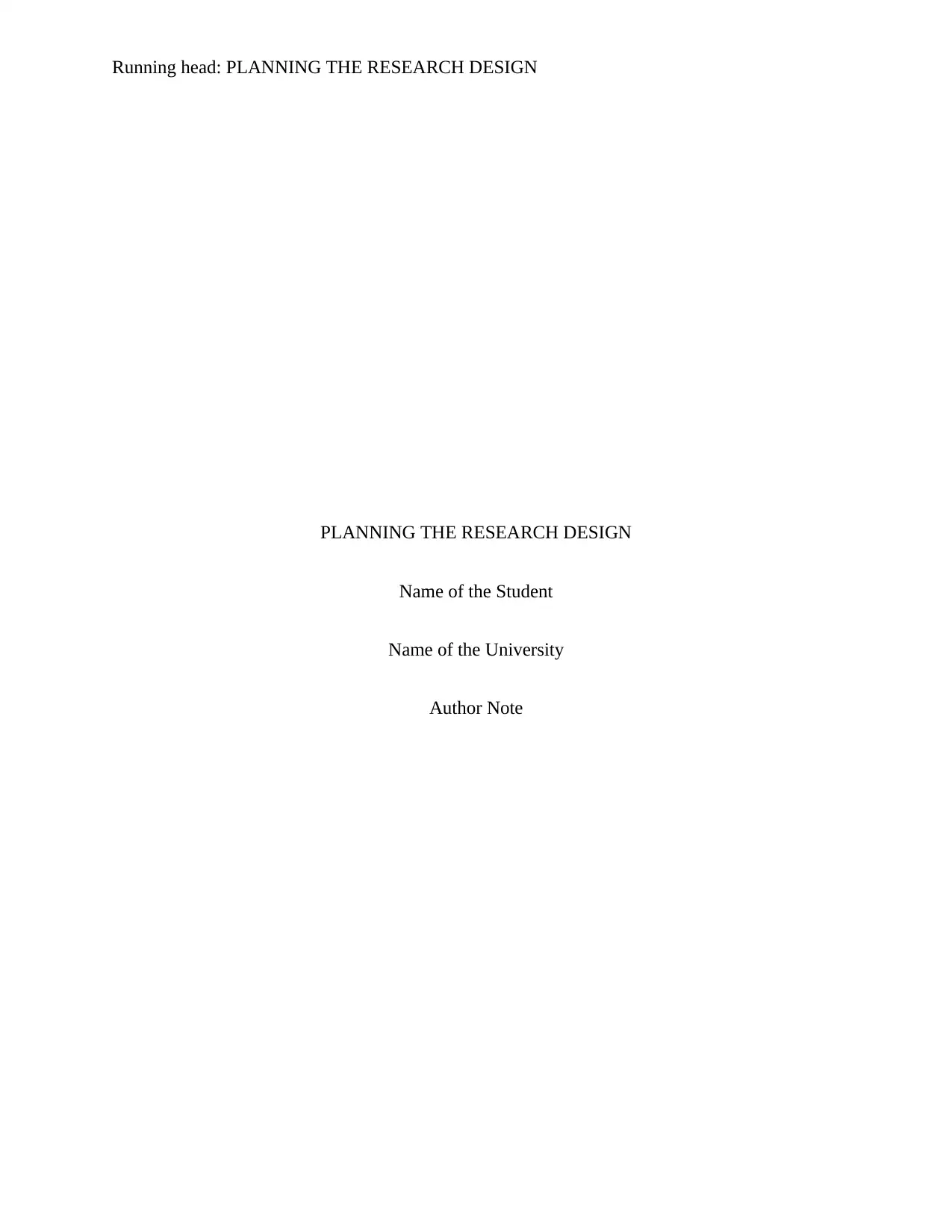
Running head: PLANNING THE RESEARCH DESIGN
PLANNING THE RESEARCH DESIGN
Name of the Student
Name of the University
Author Note
PLANNING THE RESEARCH DESIGN
Name of the Student
Name of the University
Author Note
Secure Best Marks with AI Grader
Need help grading? Try our AI Grader for instant feedback on your assignments.
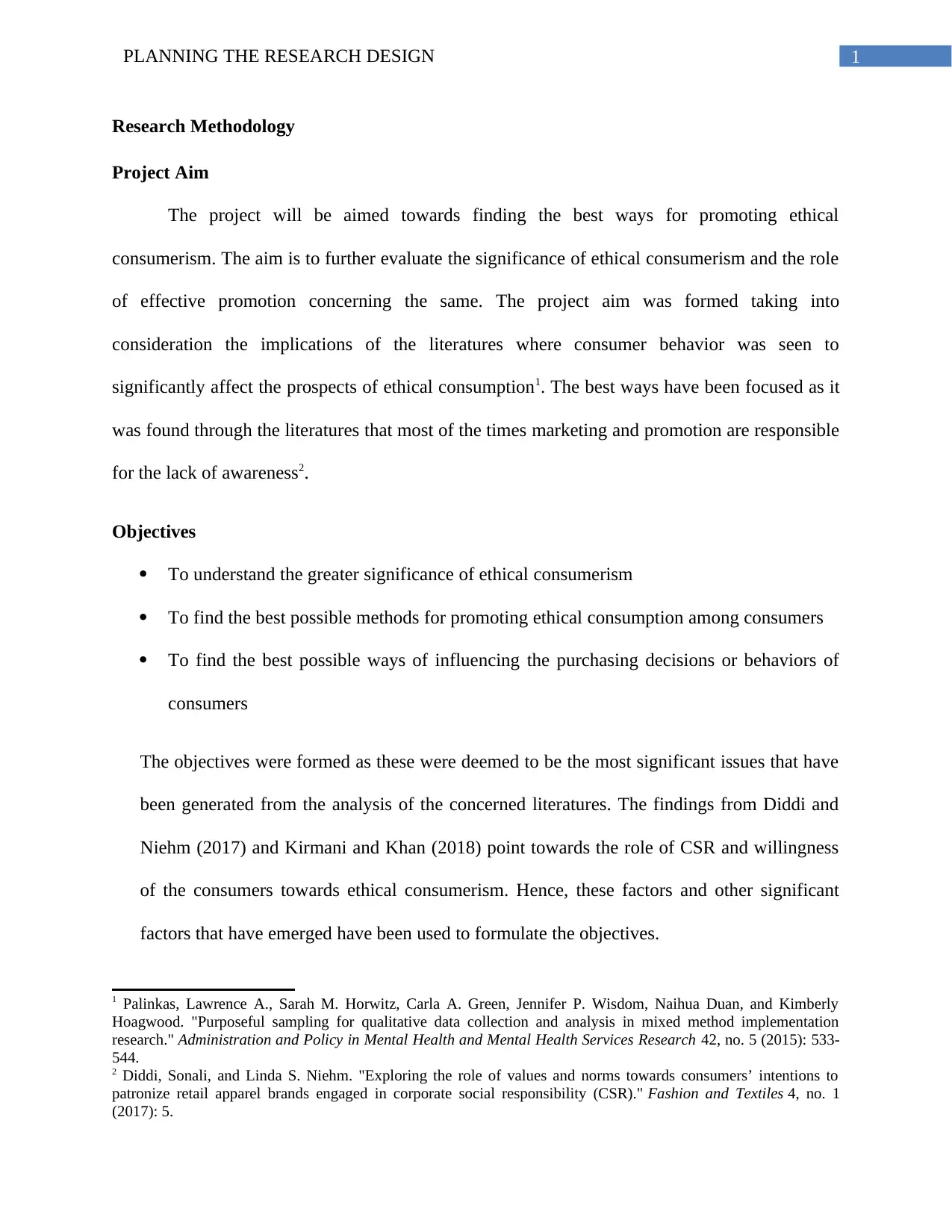
1PLANNING THE RESEARCH DESIGN
Research Methodology
Project Aim
The project will be aimed towards finding the best ways for promoting ethical
consumerism. The aim is to further evaluate the significance of ethical consumerism and the role
of effective promotion concerning the same. The project aim was formed taking into
consideration the implications of the literatures where consumer behavior was seen to
significantly affect the prospects of ethical consumption1. The best ways have been focused as it
was found through the literatures that most of the times marketing and promotion are responsible
for the lack of awareness2.
Objectives
To understand the greater significance of ethical consumerism
To find the best possible methods for promoting ethical consumption among consumers
To find the best possible ways of influencing the purchasing decisions or behaviors of
consumers
The objectives were formed as these were deemed to be the most significant issues that have
been generated from the analysis of the concerned literatures. The findings from Diddi and
Niehm (2017) and Kirmani and Khan (2018) point towards the role of CSR and willingness
of the consumers towards ethical consumerism. Hence, these factors and other significant
factors that have emerged have been used to formulate the objectives.
1 Palinkas, Lawrence A., Sarah M. Horwitz, Carla A. Green, Jennifer P. Wisdom, Naihua Duan, and Kimberly
Hoagwood. "Purposeful sampling for qualitative data collection and analysis in mixed method implementation
research." Administration and Policy in Mental Health and Mental Health Services Research 42, no. 5 (2015): 533-
544.
2 Diddi, Sonali, and Linda S. Niehm. "Exploring the role of values and norms towards consumers’ intentions to
patronize retail apparel brands engaged in corporate social responsibility (CSR)." Fashion and Textiles 4, no. 1
(2017): 5.
Research Methodology
Project Aim
The project will be aimed towards finding the best ways for promoting ethical
consumerism. The aim is to further evaluate the significance of ethical consumerism and the role
of effective promotion concerning the same. The project aim was formed taking into
consideration the implications of the literatures where consumer behavior was seen to
significantly affect the prospects of ethical consumption1. The best ways have been focused as it
was found through the literatures that most of the times marketing and promotion are responsible
for the lack of awareness2.
Objectives
To understand the greater significance of ethical consumerism
To find the best possible methods for promoting ethical consumption among consumers
To find the best possible ways of influencing the purchasing decisions or behaviors of
consumers
The objectives were formed as these were deemed to be the most significant issues that have
been generated from the analysis of the concerned literatures. The findings from Diddi and
Niehm (2017) and Kirmani and Khan (2018) point towards the role of CSR and willingness
of the consumers towards ethical consumerism. Hence, these factors and other significant
factors that have emerged have been used to formulate the objectives.
1 Palinkas, Lawrence A., Sarah M. Horwitz, Carla A. Green, Jennifer P. Wisdom, Naihua Duan, and Kimberly
Hoagwood. "Purposeful sampling for qualitative data collection and analysis in mixed method implementation
research." Administration and Policy in Mental Health and Mental Health Services Research 42, no. 5 (2015): 533-
544.
2 Diddi, Sonali, and Linda S. Niehm. "Exploring the role of values and norms towards consumers’ intentions to
patronize retail apparel brands engaged in corporate social responsibility (CSR)." Fashion and Textiles 4, no. 1
(2017): 5.
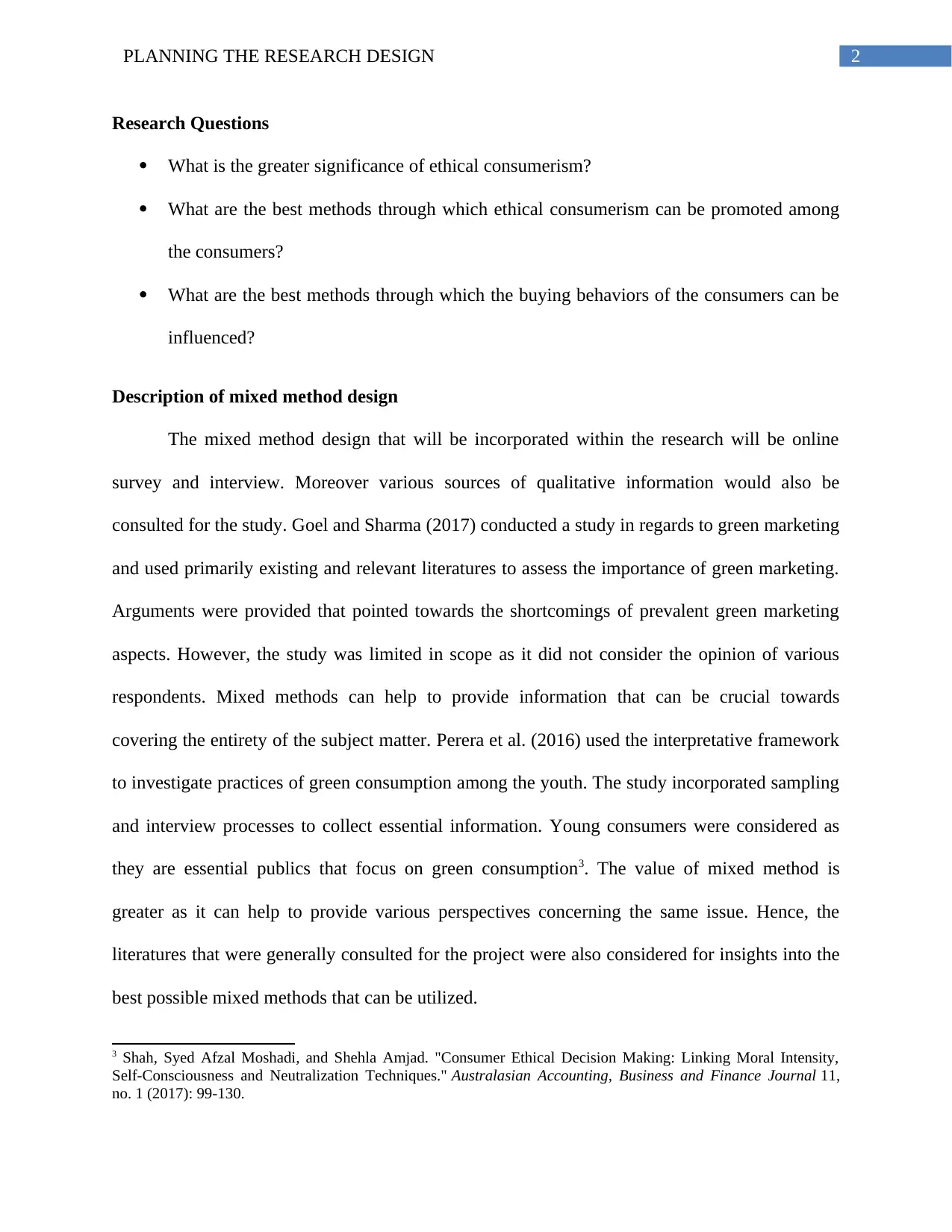
2PLANNING THE RESEARCH DESIGN
Research Questions
What is the greater significance of ethical consumerism?
What are the best methods through which ethical consumerism can be promoted among
the consumers?
What are the best methods through which the buying behaviors of the consumers can be
influenced?
Description of mixed method design
The mixed method design that will be incorporated within the research will be online
survey and interview. Moreover various sources of qualitative information would also be
consulted for the study. Goel and Sharma (2017) conducted a study in regards to green marketing
and used primarily existing and relevant literatures to assess the importance of green marketing.
Arguments were provided that pointed towards the shortcomings of prevalent green marketing
aspects. However, the study was limited in scope as it did not consider the opinion of various
respondents. Mixed methods can help to provide information that can be crucial towards
covering the entirety of the subject matter. Perera et al. (2016) used the interpretative framework
to investigate practices of green consumption among the youth. The study incorporated sampling
and interview processes to collect essential information. Young consumers were considered as
they are essential publics that focus on green consumption3. The value of mixed method is
greater as it can help to provide various perspectives concerning the same issue. Hence, the
literatures that were generally consulted for the project were also considered for insights into the
best possible mixed methods that can be utilized.
3 Shah, Syed Afzal Moshadi, and Shehla Amjad. "Consumer Ethical Decision Making: Linking Moral Intensity,
Self-Consciousness and Neutralization Techniques." Australasian Accounting, Business and Finance Journal 11,
no. 1 (2017): 99-130.
Research Questions
What is the greater significance of ethical consumerism?
What are the best methods through which ethical consumerism can be promoted among
the consumers?
What are the best methods through which the buying behaviors of the consumers can be
influenced?
Description of mixed method design
The mixed method design that will be incorporated within the research will be online
survey and interview. Moreover various sources of qualitative information would also be
consulted for the study. Goel and Sharma (2017) conducted a study in regards to green marketing
and used primarily existing and relevant literatures to assess the importance of green marketing.
Arguments were provided that pointed towards the shortcomings of prevalent green marketing
aspects. However, the study was limited in scope as it did not consider the opinion of various
respondents. Mixed methods can help to provide information that can be crucial towards
covering the entirety of the subject matter. Perera et al. (2016) used the interpretative framework
to investigate practices of green consumption among the youth. The study incorporated sampling
and interview processes to collect essential information. Young consumers were considered as
they are essential publics that focus on green consumption3. The value of mixed method is
greater as it can help to provide various perspectives concerning the same issue. Hence, the
literatures that were generally consulted for the project were also considered for insights into the
best possible mixed methods that can be utilized.
3 Shah, Syed Afzal Moshadi, and Shehla Amjad. "Consumer Ethical Decision Making: Linking Moral Intensity,
Self-Consciousness and Neutralization Techniques." Australasian Accounting, Business and Finance Journal 11,
no. 1 (2017): 99-130.
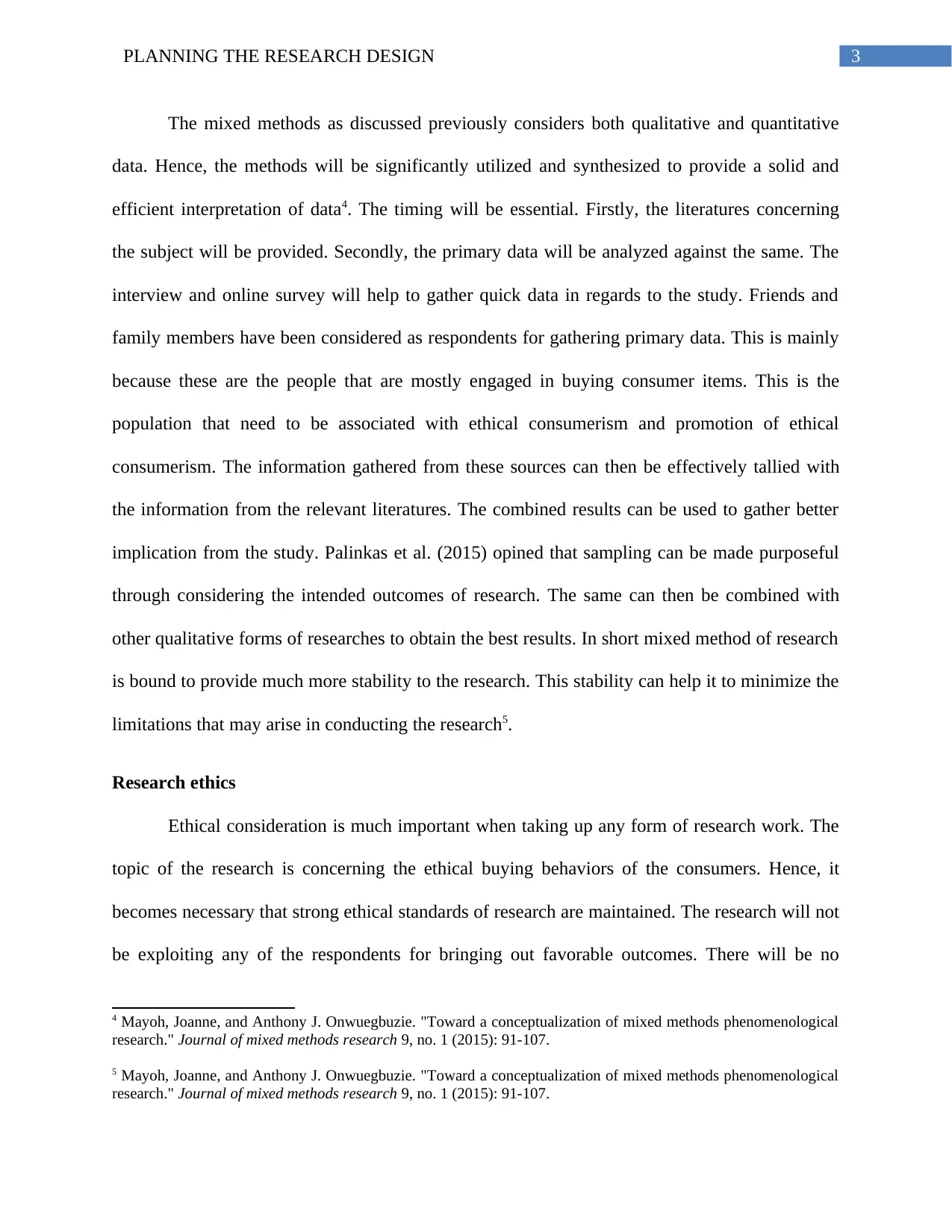
3PLANNING THE RESEARCH DESIGN
The mixed methods as discussed previously considers both qualitative and quantitative
data. Hence, the methods will be significantly utilized and synthesized to provide a solid and
efficient interpretation of data4. The timing will be essential. Firstly, the literatures concerning
the subject will be provided. Secondly, the primary data will be analyzed against the same. The
interview and online survey will help to gather quick data in regards to the study. Friends and
family members have been considered as respondents for gathering primary data. This is mainly
because these are the people that are mostly engaged in buying consumer items. This is the
population that need to be associated with ethical consumerism and promotion of ethical
consumerism. The information gathered from these sources can then be effectively tallied with
the information from the relevant literatures. The combined results can be used to gather better
implication from the study. Palinkas et al. (2015) opined that sampling can be made purposeful
through considering the intended outcomes of research. The same can then be combined with
other qualitative forms of researches to obtain the best results. In short mixed method of research
is bound to provide much more stability to the research. This stability can help it to minimize the
limitations that may arise in conducting the research5.
Research ethics
Ethical consideration is much important when taking up any form of research work. The
topic of the research is concerning the ethical buying behaviors of the consumers. Hence, it
becomes necessary that strong ethical standards of research are maintained. The research will not
be exploiting any of the respondents for bringing out favorable outcomes. There will be no
4 Mayoh, Joanne, and Anthony J. Onwuegbuzie. "Toward a conceptualization of mixed methods phenomenological
research." Journal of mixed methods research 9, no. 1 (2015): 91-107.
5 Mayoh, Joanne, and Anthony J. Onwuegbuzie. "Toward a conceptualization of mixed methods phenomenological
research." Journal of mixed methods research 9, no. 1 (2015): 91-107.
The mixed methods as discussed previously considers both qualitative and quantitative
data. Hence, the methods will be significantly utilized and synthesized to provide a solid and
efficient interpretation of data4. The timing will be essential. Firstly, the literatures concerning
the subject will be provided. Secondly, the primary data will be analyzed against the same. The
interview and online survey will help to gather quick data in regards to the study. Friends and
family members have been considered as respondents for gathering primary data. This is mainly
because these are the people that are mostly engaged in buying consumer items. This is the
population that need to be associated with ethical consumerism and promotion of ethical
consumerism. The information gathered from these sources can then be effectively tallied with
the information from the relevant literatures. The combined results can be used to gather better
implication from the study. Palinkas et al. (2015) opined that sampling can be made purposeful
through considering the intended outcomes of research. The same can then be combined with
other qualitative forms of researches to obtain the best results. In short mixed method of research
is bound to provide much more stability to the research. This stability can help it to minimize the
limitations that may arise in conducting the research5.
Research ethics
Ethical consideration is much important when taking up any form of research work. The
topic of the research is concerning the ethical buying behaviors of the consumers. Hence, it
becomes necessary that strong ethical standards of research are maintained. The research will not
be exploiting any of the respondents for bringing out favorable outcomes. There will be no
4 Mayoh, Joanne, and Anthony J. Onwuegbuzie. "Toward a conceptualization of mixed methods phenomenological
research." Journal of mixed methods research 9, no. 1 (2015): 91-107.
5 Mayoh, Joanne, and Anthony J. Onwuegbuzie. "Toward a conceptualization of mixed methods phenomenological
research." Journal of mixed methods research 9, no. 1 (2015): 91-107.
Secure Best Marks with AI Grader
Need help grading? Try our AI Grader for instant feedback on your assignments.
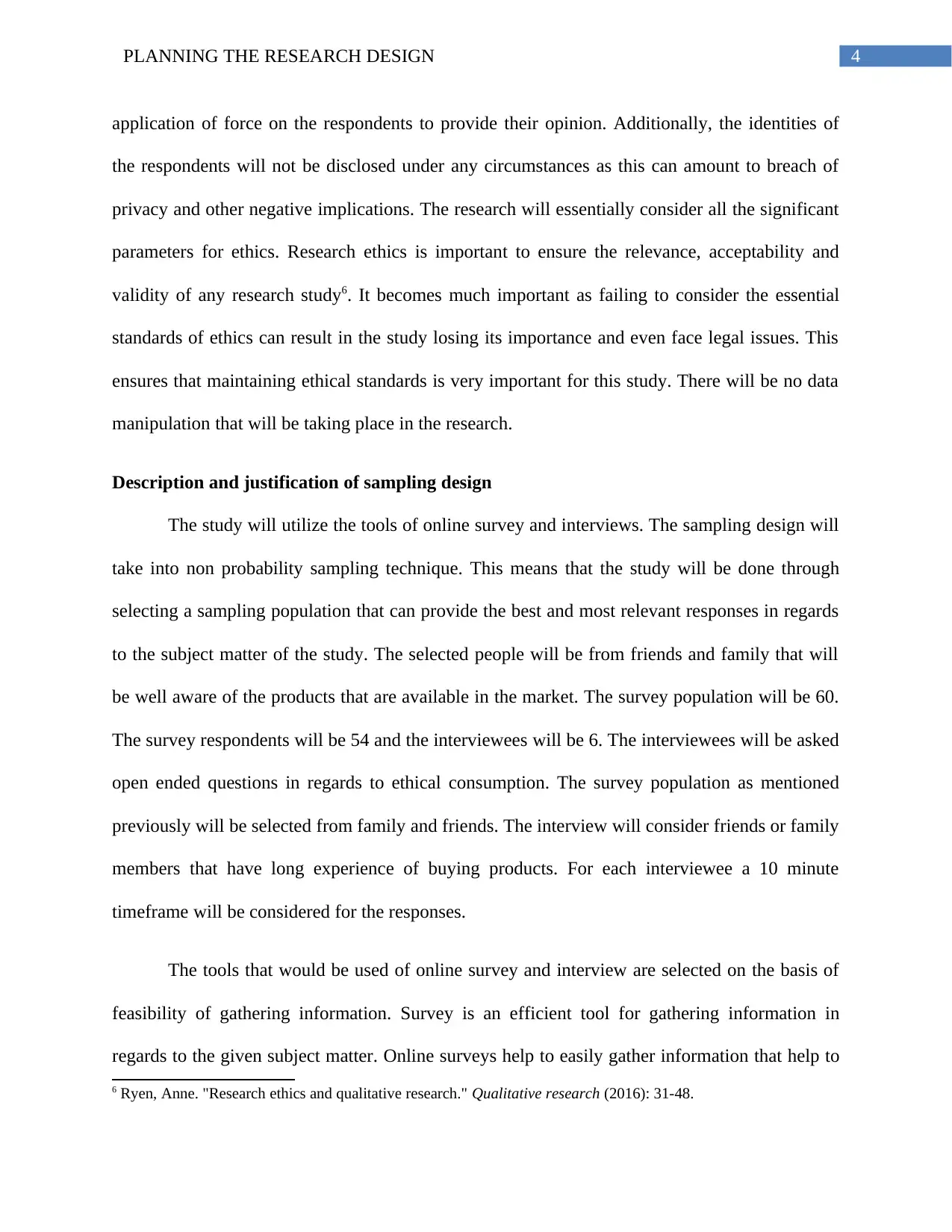
4PLANNING THE RESEARCH DESIGN
application of force on the respondents to provide their opinion. Additionally, the identities of
the respondents will not be disclosed under any circumstances as this can amount to breach of
privacy and other negative implications. The research will essentially consider all the significant
parameters for ethics. Research ethics is important to ensure the relevance, acceptability and
validity of any research study6. It becomes much important as failing to consider the essential
standards of ethics can result in the study losing its importance and even face legal issues. This
ensures that maintaining ethical standards is very important for this study. There will be no data
manipulation that will be taking place in the research.
Description and justification of sampling design
The study will utilize the tools of online survey and interviews. The sampling design will
take into non probability sampling technique. This means that the study will be done through
selecting a sampling population that can provide the best and most relevant responses in regards
to the subject matter of the study. The selected people will be from friends and family that will
be well aware of the products that are available in the market. The survey population will be 60.
The survey respondents will be 54 and the interviewees will be 6. The interviewees will be asked
open ended questions in regards to ethical consumption. The survey population as mentioned
previously will be selected from family and friends. The interview will consider friends or family
members that have long experience of buying products. For each interviewee a 10 minute
timeframe will be considered for the responses.
The tools that would be used of online survey and interview are selected on the basis of
feasibility of gathering information. Survey is an efficient tool for gathering information in
regards to the given subject matter. Online surveys help to easily gather information that help to
6 Ryen, Anne. "Research ethics and qualitative research." Qualitative research (2016): 31-48.
application of force on the respondents to provide their opinion. Additionally, the identities of
the respondents will not be disclosed under any circumstances as this can amount to breach of
privacy and other negative implications. The research will essentially consider all the significant
parameters for ethics. Research ethics is important to ensure the relevance, acceptability and
validity of any research study6. It becomes much important as failing to consider the essential
standards of ethics can result in the study losing its importance and even face legal issues. This
ensures that maintaining ethical standards is very important for this study. There will be no data
manipulation that will be taking place in the research.
Description and justification of sampling design
The study will utilize the tools of online survey and interviews. The sampling design will
take into non probability sampling technique. This means that the study will be done through
selecting a sampling population that can provide the best and most relevant responses in regards
to the subject matter of the study. The selected people will be from friends and family that will
be well aware of the products that are available in the market. The survey population will be 60.
The survey respondents will be 54 and the interviewees will be 6. The interviewees will be asked
open ended questions in regards to ethical consumption. The survey population as mentioned
previously will be selected from family and friends. The interview will consider friends or family
members that have long experience of buying products. For each interviewee a 10 minute
timeframe will be considered for the responses.
The tools that would be used of online survey and interview are selected on the basis of
feasibility of gathering information. Survey is an efficient tool for gathering information in
regards to the given subject matter. Online surveys help to easily gather information that help to
6 Ryen, Anne. "Research ethics and qualitative research." Qualitative research (2016): 31-48.
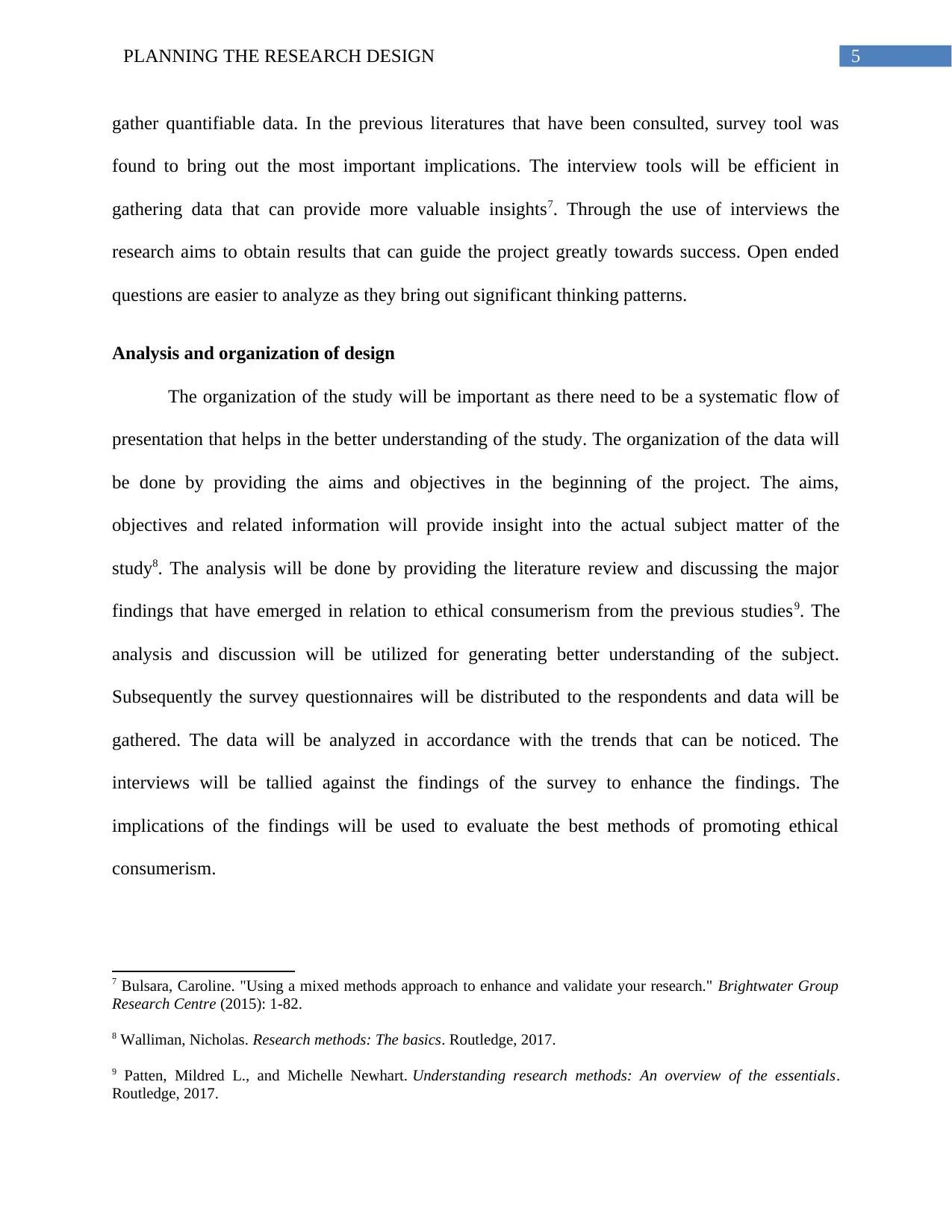
5PLANNING THE RESEARCH DESIGN
gather quantifiable data. In the previous literatures that have been consulted, survey tool was
found to bring out the most important implications. The interview tools will be efficient in
gathering data that can provide more valuable insights7. Through the use of interviews the
research aims to obtain results that can guide the project greatly towards success. Open ended
questions are easier to analyze as they bring out significant thinking patterns.
Analysis and organization of design
The organization of the study will be important as there need to be a systematic flow of
presentation that helps in the better understanding of the study. The organization of the data will
be done by providing the aims and objectives in the beginning of the project. The aims,
objectives and related information will provide insight into the actual subject matter of the
study8. The analysis will be done by providing the literature review and discussing the major
findings that have emerged in relation to ethical consumerism from the previous studies9. The
analysis and discussion will be utilized for generating better understanding of the subject.
Subsequently the survey questionnaires will be distributed to the respondents and data will be
gathered. The data will be analyzed in accordance with the trends that can be noticed. The
interviews will be tallied against the findings of the survey to enhance the findings. The
implications of the findings will be used to evaluate the best methods of promoting ethical
consumerism.
7 Bulsara, Caroline. "Using a mixed methods approach to enhance and validate your research." Brightwater Group
Research Centre (2015): 1-82.
8 Walliman, Nicholas. Research methods: The basics. Routledge, 2017.
9 Patten, Mildred L., and Michelle Newhart. Understanding research methods: An overview of the essentials.
Routledge, 2017.
gather quantifiable data. In the previous literatures that have been consulted, survey tool was
found to bring out the most important implications. The interview tools will be efficient in
gathering data that can provide more valuable insights7. Through the use of interviews the
research aims to obtain results that can guide the project greatly towards success. Open ended
questions are easier to analyze as they bring out significant thinking patterns.
Analysis and organization of design
The organization of the study will be important as there need to be a systematic flow of
presentation that helps in the better understanding of the study. The organization of the data will
be done by providing the aims and objectives in the beginning of the project. The aims,
objectives and related information will provide insight into the actual subject matter of the
study8. The analysis will be done by providing the literature review and discussing the major
findings that have emerged in relation to ethical consumerism from the previous studies9. The
analysis and discussion will be utilized for generating better understanding of the subject.
Subsequently the survey questionnaires will be distributed to the respondents and data will be
gathered. The data will be analyzed in accordance with the trends that can be noticed. The
interviews will be tallied against the findings of the survey to enhance the findings. The
implications of the findings will be used to evaluate the best methods of promoting ethical
consumerism.
7 Bulsara, Caroline. "Using a mixed methods approach to enhance and validate your research." Brightwater Group
Research Centre (2015): 1-82.
8 Walliman, Nicholas. Research methods: The basics. Routledge, 2017.
9 Patten, Mildred L., and Michelle Newhart. Understanding research methods: An overview of the essentials.
Routledge, 2017.
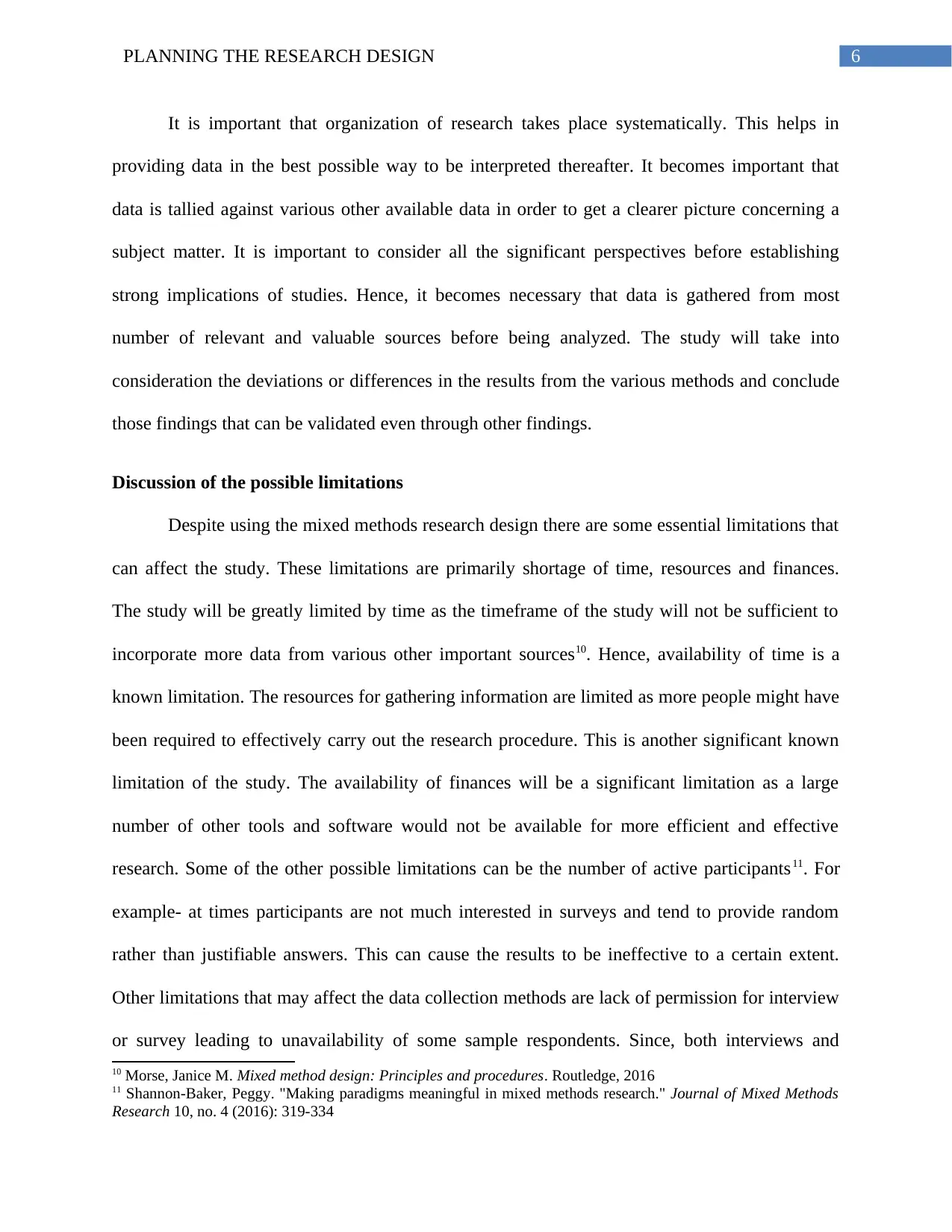
6PLANNING THE RESEARCH DESIGN
It is important that organization of research takes place systematically. This helps in
providing data in the best possible way to be interpreted thereafter. It becomes important that
data is tallied against various other available data in order to get a clearer picture concerning a
subject matter. It is important to consider all the significant perspectives before establishing
strong implications of studies. Hence, it becomes necessary that data is gathered from most
number of relevant and valuable sources before being analyzed. The study will take into
consideration the deviations or differences in the results from the various methods and conclude
those findings that can be validated even through other findings.
Discussion of the possible limitations
Despite using the mixed methods research design there are some essential limitations that
can affect the study. These limitations are primarily shortage of time, resources and finances.
The study will be greatly limited by time as the timeframe of the study will not be sufficient to
incorporate more data from various other important sources10. Hence, availability of time is a
known limitation. The resources for gathering information are limited as more people might have
been required to effectively carry out the research procedure. This is another significant known
limitation of the study. The availability of finances will be a significant limitation as a large
number of other tools and software would not be available for more efficient and effective
research. Some of the other possible limitations can be the number of active participants11. For
example- at times participants are not much interested in surveys and tend to provide random
rather than justifiable answers. This can cause the results to be ineffective to a certain extent.
Other limitations that may affect the data collection methods are lack of permission for interview
or survey leading to unavailability of some sample respondents. Since, both interviews and
10 Morse, Janice M. Mixed method design: Principles and procedures. Routledge, 2016
11 Shannon-Baker, Peggy. "Making paradigms meaningful in mixed methods research." Journal of Mixed Methods
Research 10, no. 4 (2016): 319-334
It is important that organization of research takes place systematically. This helps in
providing data in the best possible way to be interpreted thereafter. It becomes important that
data is tallied against various other available data in order to get a clearer picture concerning a
subject matter. It is important to consider all the significant perspectives before establishing
strong implications of studies. Hence, it becomes necessary that data is gathered from most
number of relevant and valuable sources before being analyzed. The study will take into
consideration the deviations or differences in the results from the various methods and conclude
those findings that can be validated even through other findings.
Discussion of the possible limitations
Despite using the mixed methods research design there are some essential limitations that
can affect the study. These limitations are primarily shortage of time, resources and finances.
The study will be greatly limited by time as the timeframe of the study will not be sufficient to
incorporate more data from various other important sources10. Hence, availability of time is a
known limitation. The resources for gathering information are limited as more people might have
been required to effectively carry out the research procedure. This is another significant known
limitation of the study. The availability of finances will be a significant limitation as a large
number of other tools and software would not be available for more efficient and effective
research. Some of the other possible limitations can be the number of active participants11. For
example- at times participants are not much interested in surveys and tend to provide random
rather than justifiable answers. This can cause the results to be ineffective to a certain extent.
Other limitations that may affect the data collection methods are lack of permission for interview
or survey leading to unavailability of some sample respondents. Since, both interviews and
10 Morse, Janice M. Mixed method design: Principles and procedures. Routledge, 2016
11 Shannon-Baker, Peggy. "Making paradigms meaningful in mixed methods research." Journal of Mixed Methods
Research 10, no. 4 (2016): 319-334
Paraphrase This Document
Need a fresh take? Get an instant paraphrase of this document with our AI Paraphraser
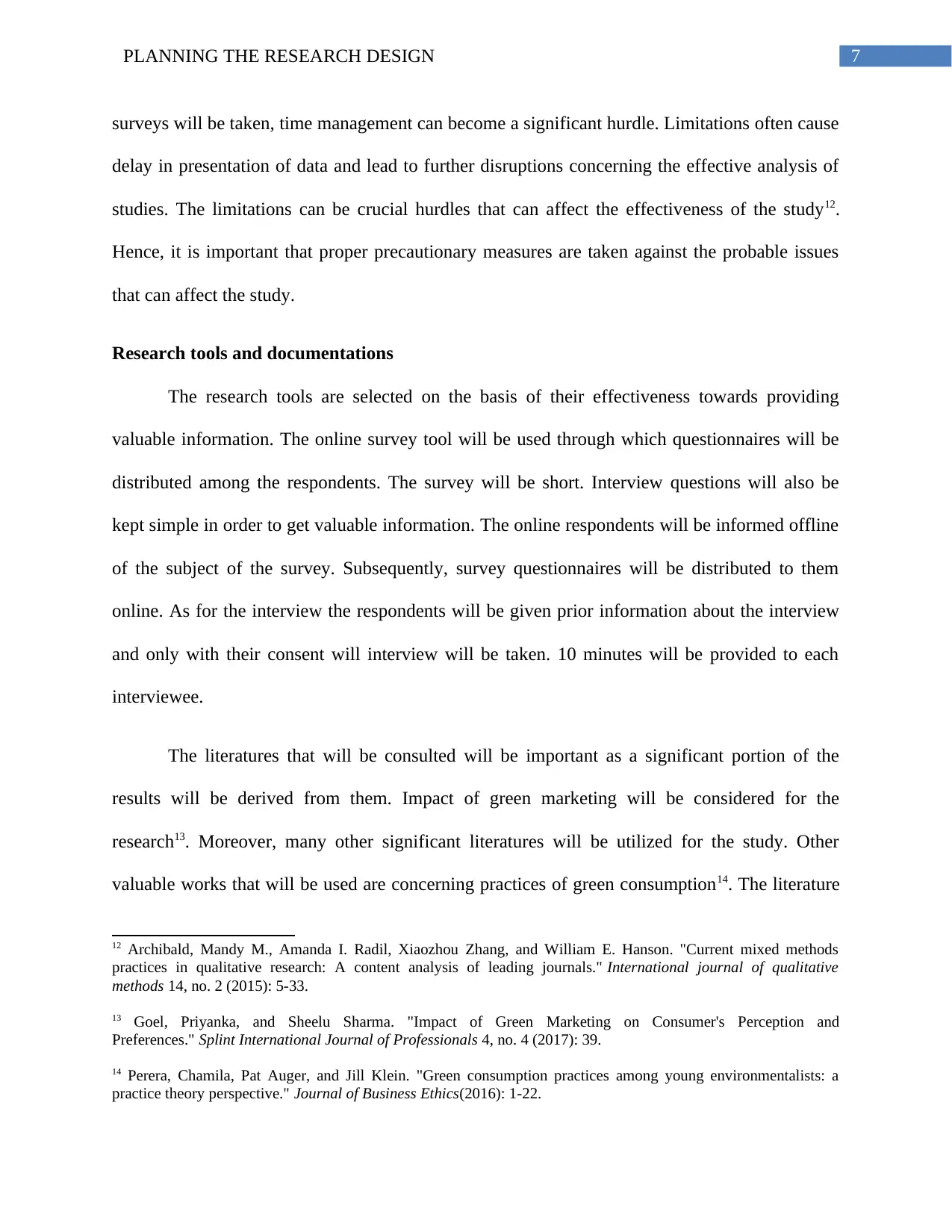
7PLANNING THE RESEARCH DESIGN
surveys will be taken, time management can become a significant hurdle. Limitations often cause
delay in presentation of data and lead to further disruptions concerning the effective analysis of
studies. The limitations can be crucial hurdles that can affect the effectiveness of the study12.
Hence, it is important that proper precautionary measures are taken against the probable issues
that can affect the study.
Research tools and documentations
The research tools are selected on the basis of their effectiveness towards providing
valuable information. The online survey tool will be used through which questionnaires will be
distributed among the respondents. The survey will be short. Interview questions will also be
kept simple in order to get valuable information. The online respondents will be informed offline
of the subject of the survey. Subsequently, survey questionnaires will be distributed to them
online. As for the interview the respondents will be given prior information about the interview
and only with their consent will interview will be taken. 10 minutes will be provided to each
interviewee.
The literatures that will be consulted will be important as a significant portion of the
results will be derived from them. Impact of green marketing will be considered for the
research13. Moreover, many other significant literatures will be utilized for the study. Other
valuable works that will be used are concerning practices of green consumption14. The literature
12 Archibald, Mandy M., Amanda I. Radil, Xiaozhou Zhang, and William E. Hanson. "Current mixed methods
practices in qualitative research: A content analysis of leading journals." International journal of qualitative
methods 14, no. 2 (2015): 5-33.
13 Goel, Priyanka, and Sheelu Sharma. "Impact of Green Marketing on Consumer's Perception and
Preferences." Splint International Journal of Professionals 4, no. 4 (2017): 39.
14 Perera, Chamila, Pat Auger, and Jill Klein. "Green consumption practices among young environmentalists: a
practice theory perspective." Journal of Business Ethics(2016): 1-22.
surveys will be taken, time management can become a significant hurdle. Limitations often cause
delay in presentation of data and lead to further disruptions concerning the effective analysis of
studies. The limitations can be crucial hurdles that can affect the effectiveness of the study12.
Hence, it is important that proper precautionary measures are taken against the probable issues
that can affect the study.
Research tools and documentations
The research tools are selected on the basis of their effectiveness towards providing
valuable information. The online survey tool will be used through which questionnaires will be
distributed among the respondents. The survey will be short. Interview questions will also be
kept simple in order to get valuable information. The online respondents will be informed offline
of the subject of the survey. Subsequently, survey questionnaires will be distributed to them
online. As for the interview the respondents will be given prior information about the interview
and only with their consent will interview will be taken. 10 minutes will be provided to each
interviewee.
The literatures that will be consulted will be important as a significant portion of the
results will be derived from them. Impact of green marketing will be considered for the
research13. Moreover, many other significant literatures will be utilized for the study. Other
valuable works that will be used are concerning practices of green consumption14. The literature
12 Archibald, Mandy M., Amanda I. Radil, Xiaozhou Zhang, and William E. Hanson. "Current mixed methods
practices in qualitative research: A content analysis of leading journals." International journal of qualitative
methods 14, no. 2 (2015): 5-33.
13 Goel, Priyanka, and Sheelu Sharma. "Impact of Green Marketing on Consumer's Perception and
Preferences." Splint International Journal of Professionals 4, no. 4 (2017): 39.
14 Perera, Chamila, Pat Auger, and Jill Klein. "Green consumption practices among young environmentalists: a
practice theory perspective." Journal of Business Ethics(2016): 1-22.
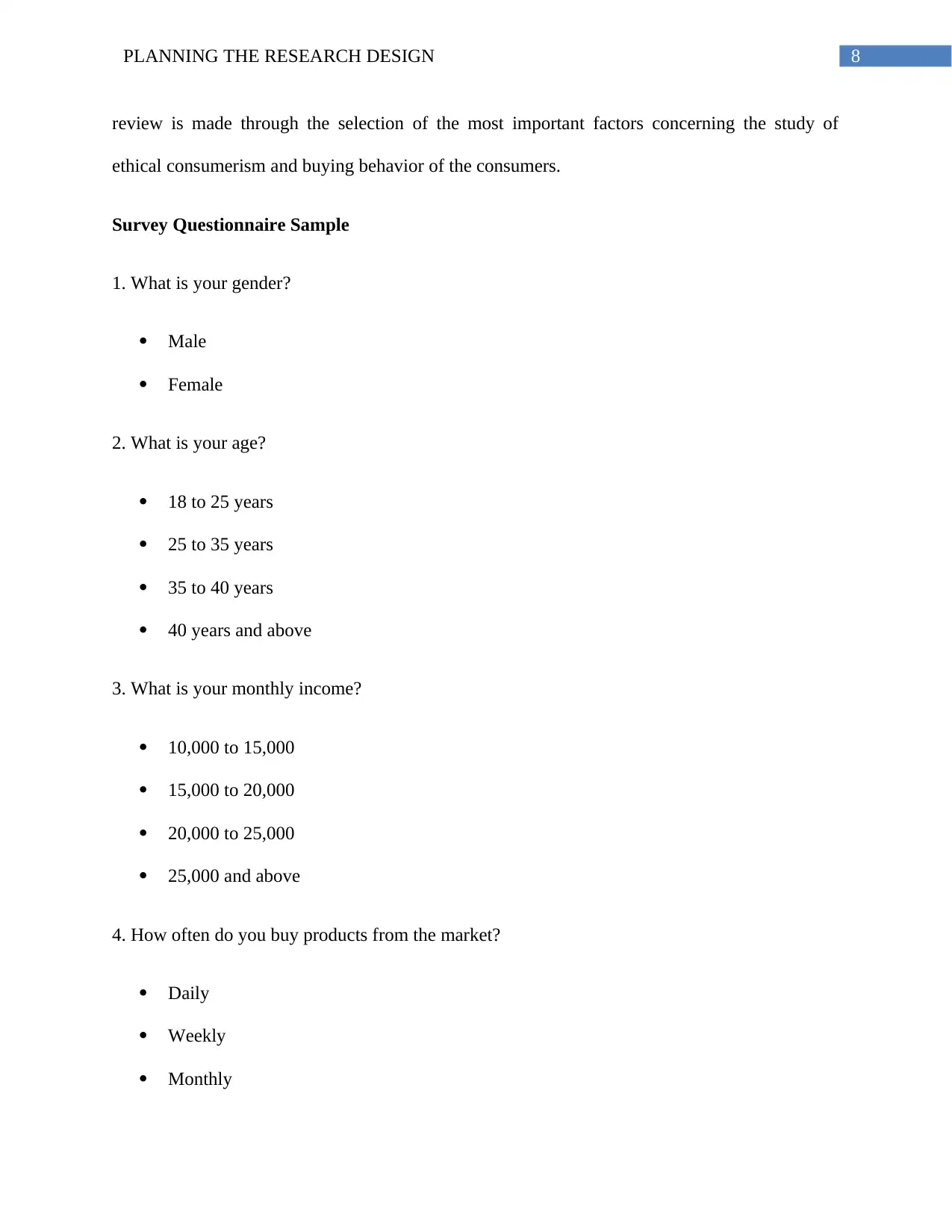
8PLANNING THE RESEARCH DESIGN
review is made through the selection of the most important factors concerning the study of
ethical consumerism and buying behavior of the consumers.
Survey Questionnaire Sample
1. What is your gender?
Male
Female
2. What is your age?
18 to 25 years
25 to 35 years
35 to 40 years
40 years and above
3. What is your monthly income?
10,000 to 15,000
15,000 to 20,000
20,000 to 25,000
25,000 and above
4. How often do you buy products from the market?
Daily
Weekly
Monthly
review is made through the selection of the most important factors concerning the study of
ethical consumerism and buying behavior of the consumers.
Survey Questionnaire Sample
1. What is your gender?
Male
Female
2. What is your age?
18 to 25 years
25 to 35 years
35 to 40 years
40 years and above
3. What is your monthly income?
10,000 to 15,000
15,000 to 20,000
20,000 to 25,000
25,000 and above
4. How often do you buy products from the market?
Daily
Weekly
Monthly
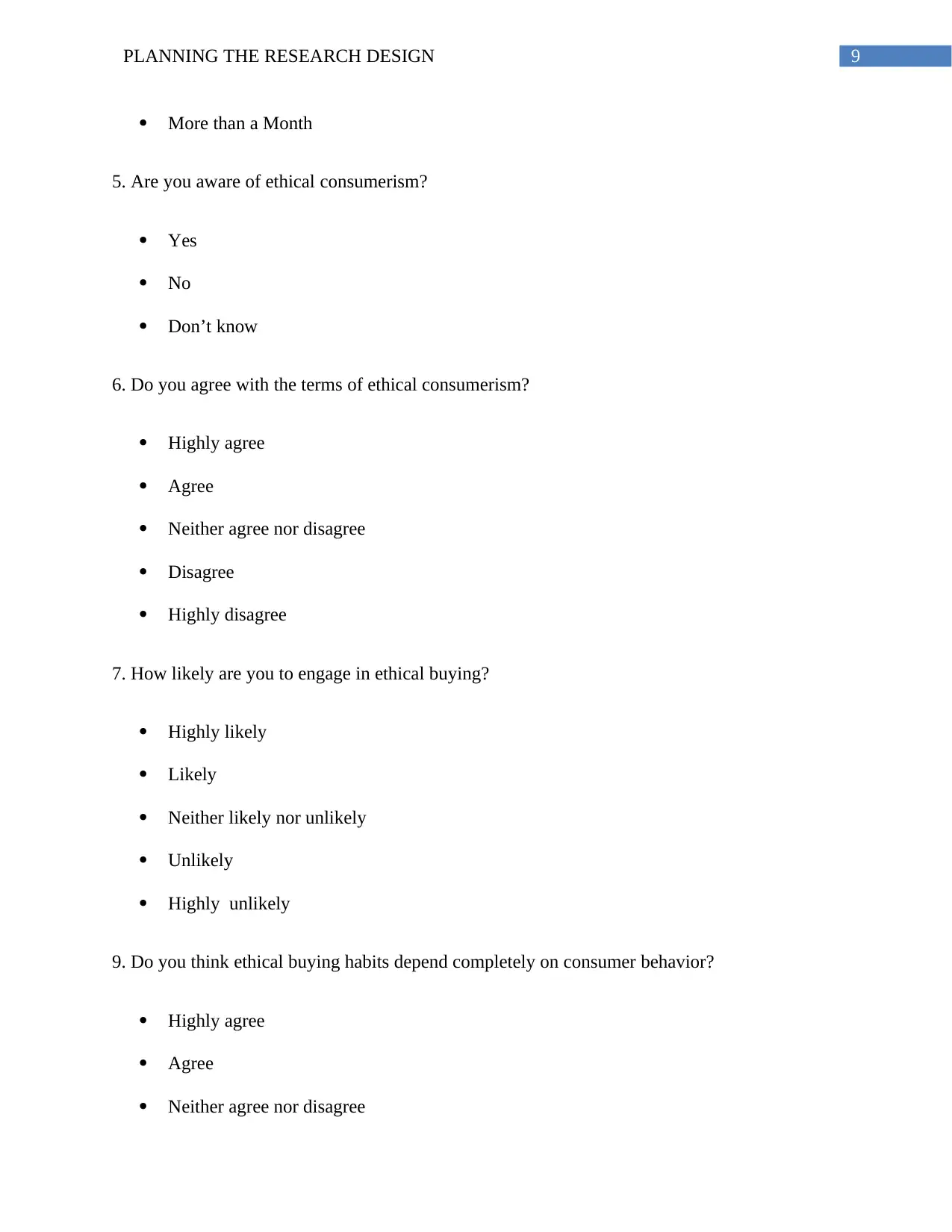
9PLANNING THE RESEARCH DESIGN
More than a Month
5. Are you aware of ethical consumerism?
Yes
No
Don’t know
6. Do you agree with the terms of ethical consumerism?
Highly agree
Agree
Neither agree nor disagree
Disagree
Highly disagree
7. How likely are you to engage in ethical buying?
Highly likely
Likely
Neither likely nor unlikely
Unlikely
Highly unlikely
9. Do you think ethical buying habits depend completely on consumer behavior?
Highly agree
Agree
Neither agree nor disagree
More than a Month
5. Are you aware of ethical consumerism?
Yes
No
Don’t know
6. Do you agree with the terms of ethical consumerism?
Highly agree
Agree
Neither agree nor disagree
Disagree
Highly disagree
7. How likely are you to engage in ethical buying?
Highly likely
Likely
Neither likely nor unlikely
Unlikely
Highly unlikely
9. Do you think ethical buying habits depend completely on consumer behavior?
Highly agree
Agree
Neither agree nor disagree
Secure Best Marks with AI Grader
Need help grading? Try our AI Grader for instant feedback on your assignments.
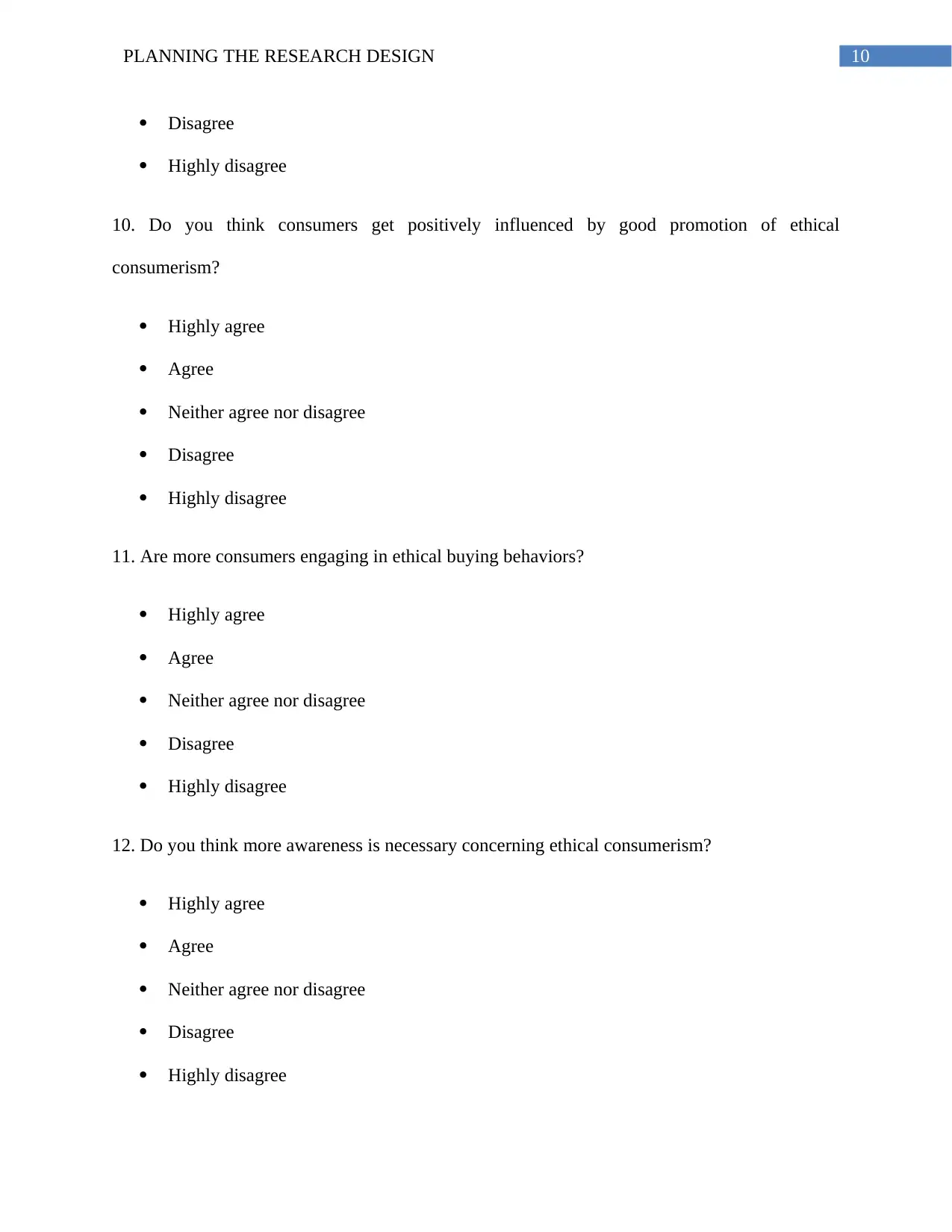
10PLANNING THE RESEARCH DESIGN
Disagree
Highly disagree
10. Do you think consumers get positively influenced by good promotion of ethical
consumerism?
Highly agree
Agree
Neither agree nor disagree
Disagree
Highly disagree
11. Are more consumers engaging in ethical buying behaviors?
Highly agree
Agree
Neither agree nor disagree
Disagree
Highly disagree
12. Do you think more awareness is necessary concerning ethical consumerism?
Highly agree
Agree
Neither agree nor disagree
Disagree
Highly disagree
Disagree
Highly disagree
10. Do you think consumers get positively influenced by good promotion of ethical
consumerism?
Highly agree
Agree
Neither agree nor disagree
Disagree
Highly disagree
11. Are more consumers engaging in ethical buying behaviors?
Highly agree
Agree
Neither agree nor disagree
Disagree
Highly disagree
12. Do you think more awareness is necessary concerning ethical consumerism?
Highly agree
Agree
Neither agree nor disagree
Disagree
Highly disagree
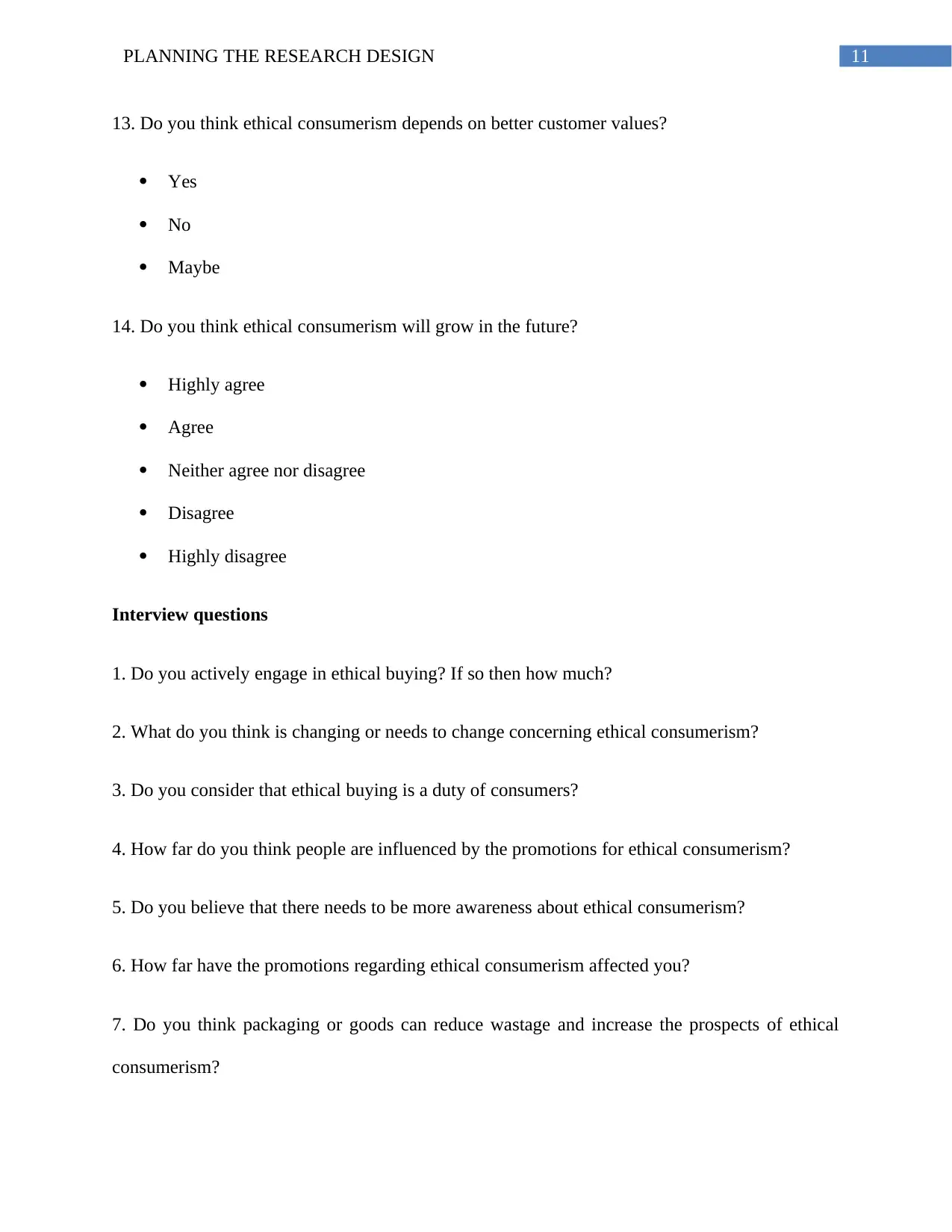
11PLANNING THE RESEARCH DESIGN
13. Do you think ethical consumerism depends on better customer values?
Yes
No
Maybe
14. Do you think ethical consumerism will grow in the future?
Highly agree
Agree
Neither agree nor disagree
Disagree
Highly disagree
Interview questions
1. Do you actively engage in ethical buying? If so then how much?
2. What do you think is changing or needs to change concerning ethical consumerism?
3. Do you consider that ethical buying is a duty of consumers?
4. How far do you think people are influenced by the promotions for ethical consumerism?
5. Do you believe that there needs to be more awareness about ethical consumerism?
6. How far have the promotions regarding ethical consumerism affected you?
7. Do you think packaging or goods can reduce wastage and increase the prospects of ethical
consumerism?
13. Do you think ethical consumerism depends on better customer values?
Yes
No
Maybe
14. Do you think ethical consumerism will grow in the future?
Highly agree
Agree
Neither agree nor disagree
Disagree
Highly disagree
Interview questions
1. Do you actively engage in ethical buying? If so then how much?
2. What do you think is changing or needs to change concerning ethical consumerism?
3. Do you consider that ethical buying is a duty of consumers?
4. How far do you think people are influenced by the promotions for ethical consumerism?
5. Do you believe that there needs to be more awareness about ethical consumerism?
6. How far have the promotions regarding ethical consumerism affected you?
7. Do you think packaging or goods can reduce wastage and increase the prospects of ethical
consumerism?
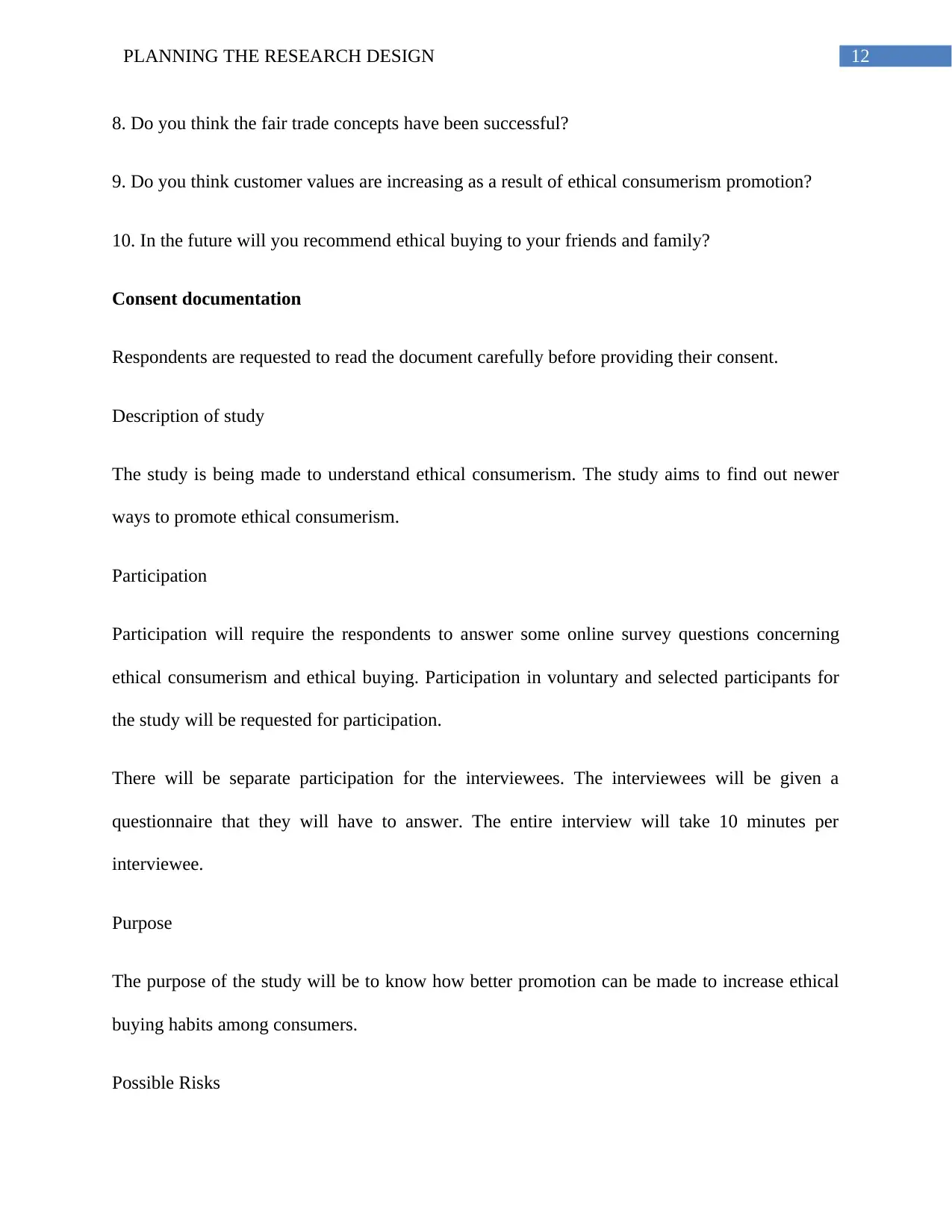
12PLANNING THE RESEARCH DESIGN
8. Do you think the fair trade concepts have been successful?
9. Do you think customer values are increasing as a result of ethical consumerism promotion?
10. In the future will you recommend ethical buying to your friends and family?
Consent documentation
Respondents are requested to read the document carefully before providing their consent.
Description of study
The study is being made to understand ethical consumerism. The study aims to find out newer
ways to promote ethical consumerism.
Participation
Participation will require the respondents to answer some online survey questions concerning
ethical consumerism and ethical buying. Participation in voluntary and selected participants for
the study will be requested for participation.
There will be separate participation for the interviewees. The interviewees will be given a
questionnaire that they will have to answer. The entire interview will take 10 minutes per
interviewee.
Purpose
The purpose of the study will be to know how better promotion can be made to increase ethical
buying habits among consumers.
Possible Risks
8. Do you think the fair trade concepts have been successful?
9. Do you think customer values are increasing as a result of ethical consumerism promotion?
10. In the future will you recommend ethical buying to your friends and family?
Consent documentation
Respondents are requested to read the document carefully before providing their consent.
Description of study
The study is being made to understand ethical consumerism. The study aims to find out newer
ways to promote ethical consumerism.
Participation
Participation will require the respondents to answer some online survey questions concerning
ethical consumerism and ethical buying. Participation in voluntary and selected participants for
the study will be requested for participation.
There will be separate participation for the interviewees. The interviewees will be given a
questionnaire that they will have to answer. The entire interview will take 10 minutes per
interviewee.
Purpose
The purpose of the study will be to know how better promotion can be made to increase ethical
buying habits among consumers.
Possible Risks
Paraphrase This Document
Need a fresh take? Get an instant paraphrase of this document with our AI Paraphraser
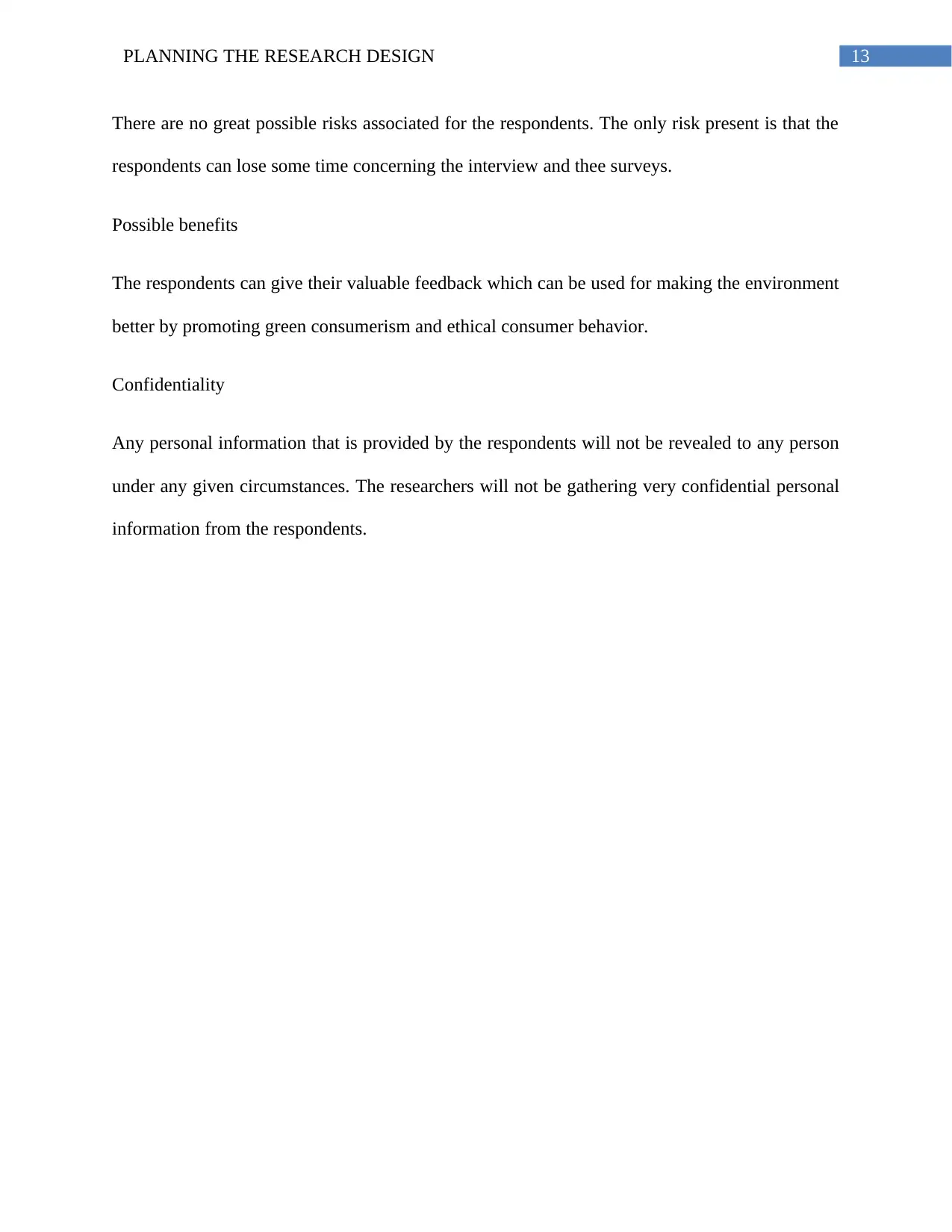
13PLANNING THE RESEARCH DESIGN
There are no great possible risks associated for the respondents. The only risk present is that the
respondents can lose some time concerning the interview and thee surveys.
Possible benefits
The respondents can give their valuable feedback which can be used for making the environment
better by promoting green consumerism and ethical consumer behavior.
Confidentiality
Any personal information that is provided by the respondents will not be revealed to any person
under any given circumstances. The researchers will not be gathering very confidential personal
information from the respondents.
There are no great possible risks associated for the respondents. The only risk present is that the
respondents can lose some time concerning the interview and thee surveys.
Possible benefits
The respondents can give their valuable feedback which can be used for making the environment
better by promoting green consumerism and ethical consumer behavior.
Confidentiality
Any personal information that is provided by the respondents will not be revealed to any person
under any given circumstances. The researchers will not be gathering very confidential personal
information from the respondents.
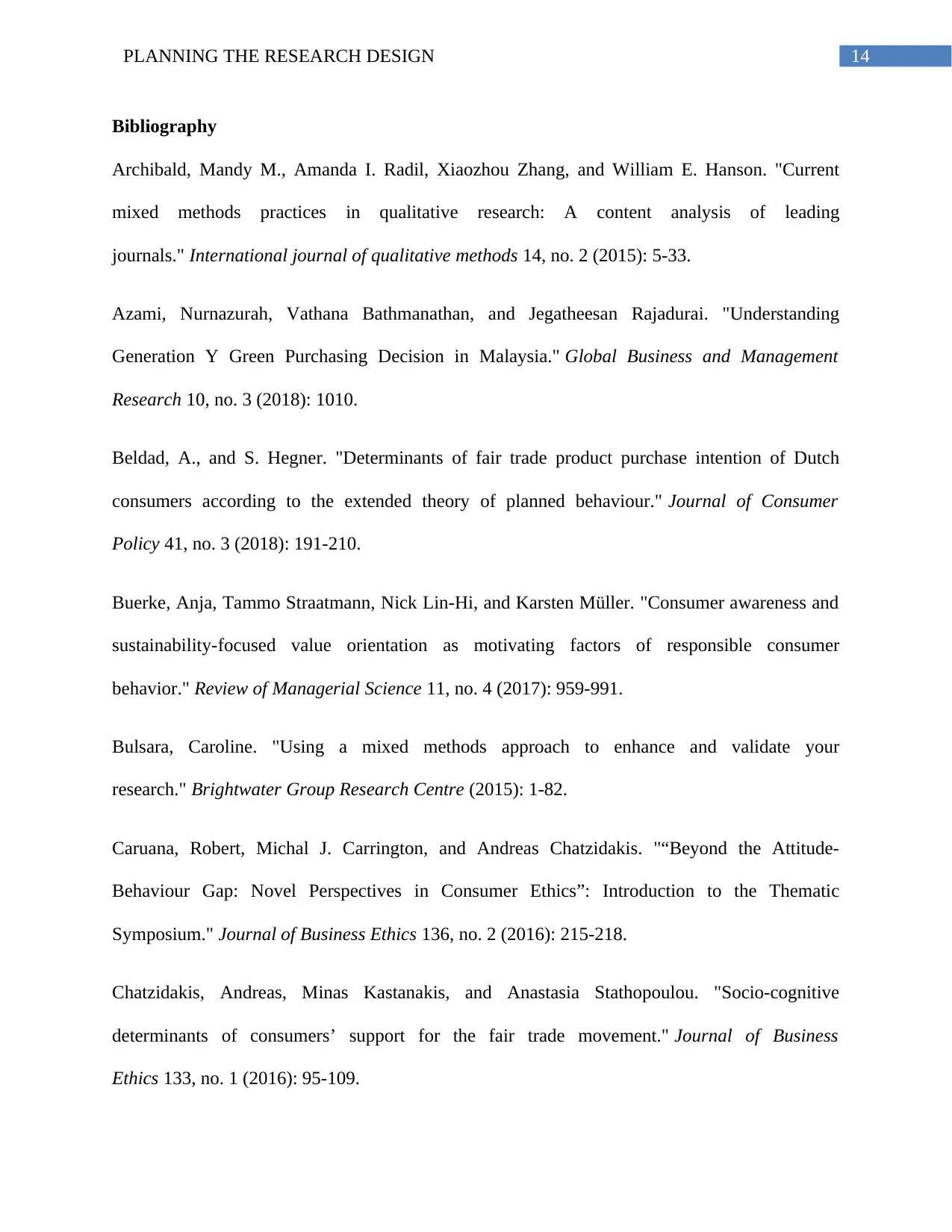
14PLANNING THE RESEARCH DESIGN
Bibliography
Archibald, Mandy M., Amanda I. Radil, Xiaozhou Zhang, and William E. Hanson. "Current
mixed methods practices in qualitative research: A content analysis of leading
journals." International journal of qualitative methods 14, no. 2 (2015): 5-33.
Azami, Nurnazurah, Vathana Bathmanathan, and Jegatheesan Rajadurai. "Understanding
Generation Y Green Purchasing Decision in Malaysia." Global Business and Management
Research 10, no. 3 (2018): 1010.
Beldad, A., and S. Hegner. "Determinants of fair trade product purchase intention of Dutch
consumers according to the extended theory of planned behaviour." Journal of Consumer
Policy 41, no. 3 (2018): 191-210.
Buerke, Anja, Tammo Straatmann, Nick Lin-Hi, and Karsten Müller. "Consumer awareness and
sustainability-focused value orientation as motivating factors of responsible consumer
behavior." Review of Managerial Science 11, no. 4 (2017): 959-991.
Bulsara, Caroline. "Using a mixed methods approach to enhance and validate your
research." Brightwater Group Research Centre (2015): 1-82.
Caruana, Robert, Michal J. Carrington, and Andreas Chatzidakis. "“Beyond the Attitude-
Behaviour Gap: Novel Perspectives in Consumer Ethics”: Introduction to the Thematic
Symposium." Journal of Business Ethics 136, no. 2 (2016): 215-218.
Chatzidakis, Andreas, Minas Kastanakis, and Anastasia Stathopoulou. "Socio-cognitive
determinants of consumers’ support for the fair trade movement." Journal of Business
Ethics 133, no. 1 (2016): 95-109.
Bibliography
Archibald, Mandy M., Amanda I. Radil, Xiaozhou Zhang, and William E. Hanson. "Current
mixed methods practices in qualitative research: A content analysis of leading
journals." International journal of qualitative methods 14, no. 2 (2015): 5-33.
Azami, Nurnazurah, Vathana Bathmanathan, and Jegatheesan Rajadurai. "Understanding
Generation Y Green Purchasing Decision in Malaysia." Global Business and Management
Research 10, no. 3 (2018): 1010.
Beldad, A., and S. Hegner. "Determinants of fair trade product purchase intention of Dutch
consumers according to the extended theory of planned behaviour." Journal of Consumer
Policy 41, no. 3 (2018): 191-210.
Buerke, Anja, Tammo Straatmann, Nick Lin-Hi, and Karsten Müller. "Consumer awareness and
sustainability-focused value orientation as motivating factors of responsible consumer
behavior." Review of Managerial Science 11, no. 4 (2017): 959-991.
Bulsara, Caroline. "Using a mixed methods approach to enhance and validate your
research." Brightwater Group Research Centre (2015): 1-82.
Caruana, Robert, Michal J. Carrington, and Andreas Chatzidakis. "“Beyond the Attitude-
Behaviour Gap: Novel Perspectives in Consumer Ethics”: Introduction to the Thematic
Symposium." Journal of Business Ethics 136, no. 2 (2016): 215-218.
Chatzidakis, Andreas, Minas Kastanakis, and Anastasia Stathopoulou. "Socio-cognitive
determinants of consumers’ support for the fair trade movement." Journal of Business
Ethics 133, no. 1 (2016): 95-109.
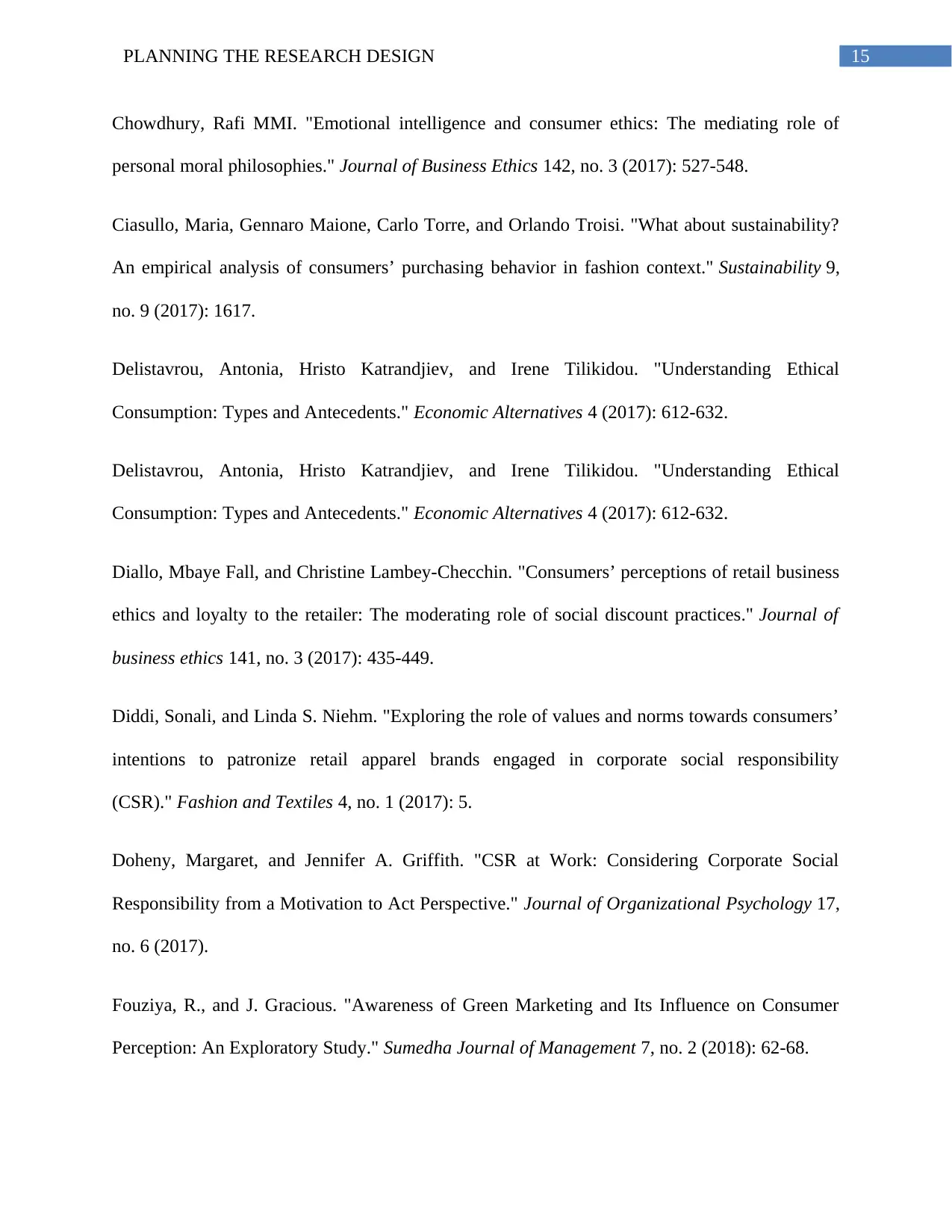
15PLANNING THE RESEARCH DESIGN
Chowdhury, Rafi MMI. "Emotional intelligence and consumer ethics: The mediating role of
personal moral philosophies." Journal of Business Ethics 142, no. 3 (2017): 527-548.
Ciasullo, Maria, Gennaro Maione, Carlo Torre, and Orlando Troisi. "What about sustainability?
An empirical analysis of consumers’ purchasing behavior in fashion context." Sustainability 9,
no. 9 (2017): 1617.
Delistavrou, Antonia, Hristo Katrandjiev, and Irene Tilikidou. "Understanding Ethical
Consumption: Types and Antecedents." Economic Alternatives 4 (2017): 612-632.
Delistavrou, Antonia, Hristo Katrandjiev, and Irene Tilikidou. "Understanding Ethical
Consumption: Types and Antecedents." Economic Alternatives 4 (2017): 612-632.
Diallo, Mbaye Fall, and Christine Lambey-Checchin. "Consumers’ perceptions of retail business
ethics and loyalty to the retailer: The moderating role of social discount practices." Journal of
business ethics 141, no. 3 (2017): 435-449.
Diddi, Sonali, and Linda S. Niehm. "Exploring the role of values and norms towards consumers’
intentions to patronize retail apparel brands engaged in corporate social responsibility
(CSR)." Fashion and Textiles 4, no. 1 (2017): 5.
Doheny, Margaret, and Jennifer A. Griffith. "CSR at Work: Considering Corporate Social
Responsibility from a Motivation to Act Perspective." Journal of Organizational Psychology 17,
no. 6 (2017).
Fouziya, R., and J. Gracious. "Awareness of Green Marketing and Its Influence on Consumer
Perception: An Exploratory Study." Sumedha Journal of Management 7, no. 2 (2018): 62-68.
Chowdhury, Rafi MMI. "Emotional intelligence and consumer ethics: The mediating role of
personal moral philosophies." Journal of Business Ethics 142, no. 3 (2017): 527-548.
Ciasullo, Maria, Gennaro Maione, Carlo Torre, and Orlando Troisi. "What about sustainability?
An empirical analysis of consumers’ purchasing behavior in fashion context." Sustainability 9,
no. 9 (2017): 1617.
Delistavrou, Antonia, Hristo Katrandjiev, and Irene Tilikidou. "Understanding Ethical
Consumption: Types and Antecedents." Economic Alternatives 4 (2017): 612-632.
Delistavrou, Antonia, Hristo Katrandjiev, and Irene Tilikidou. "Understanding Ethical
Consumption: Types and Antecedents." Economic Alternatives 4 (2017): 612-632.
Diallo, Mbaye Fall, and Christine Lambey-Checchin. "Consumers’ perceptions of retail business
ethics and loyalty to the retailer: The moderating role of social discount practices." Journal of
business ethics 141, no. 3 (2017): 435-449.
Diddi, Sonali, and Linda S. Niehm. "Exploring the role of values and norms towards consumers’
intentions to patronize retail apparel brands engaged in corporate social responsibility
(CSR)." Fashion and Textiles 4, no. 1 (2017): 5.
Doheny, Margaret, and Jennifer A. Griffith. "CSR at Work: Considering Corporate Social
Responsibility from a Motivation to Act Perspective." Journal of Organizational Psychology 17,
no. 6 (2017).
Fouziya, R., and J. Gracious. "Awareness of Green Marketing and Its Influence on Consumer
Perception: An Exploratory Study." Sumedha Journal of Management 7, no. 2 (2018): 62-68.
Secure Best Marks with AI Grader
Need help grading? Try our AI Grader for instant feedback on your assignments.
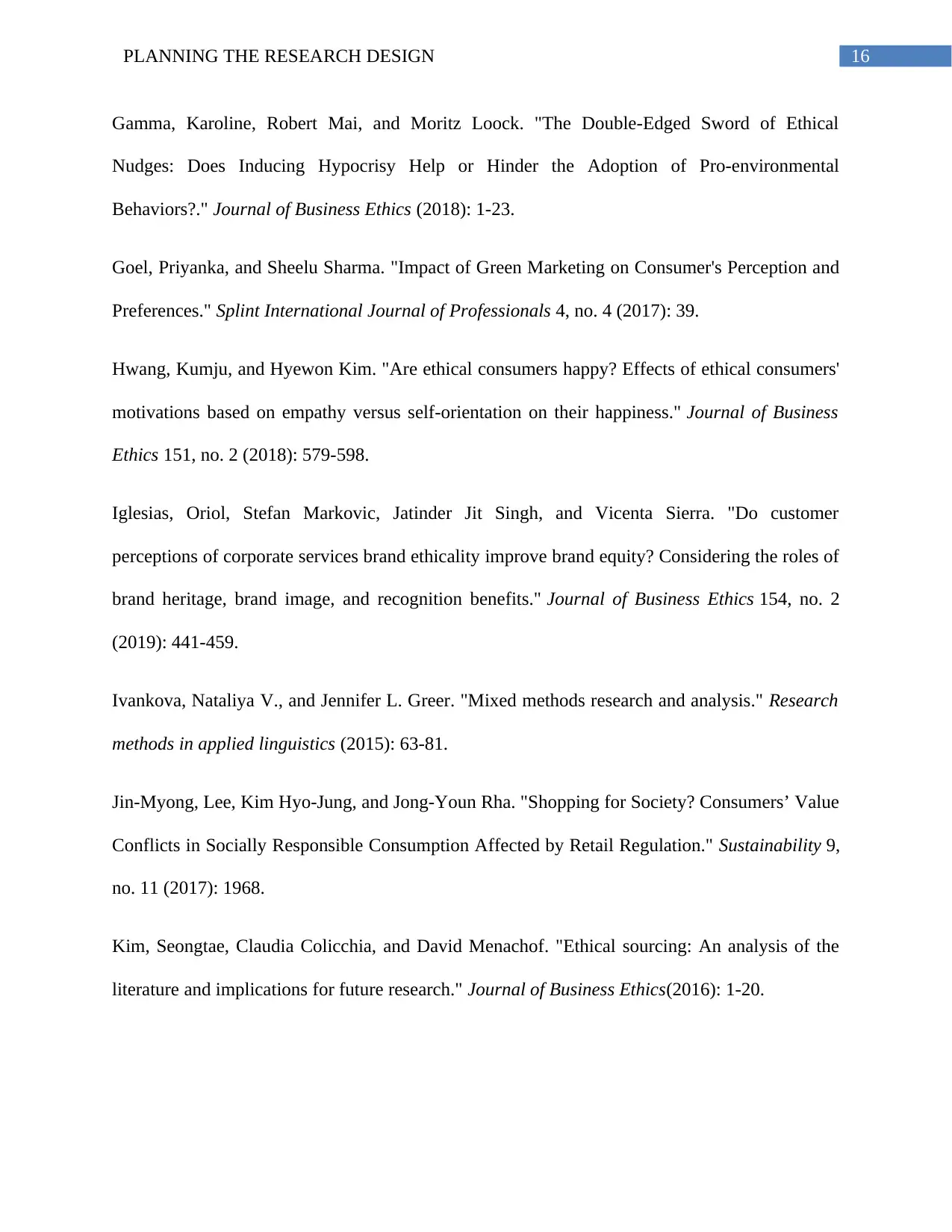
16PLANNING THE RESEARCH DESIGN
Gamma, Karoline, Robert Mai, and Moritz Loock. "The Double-Edged Sword of Ethical
Nudges: Does Inducing Hypocrisy Help or Hinder the Adoption of Pro-environmental
Behaviors?." Journal of Business Ethics (2018): 1-23.
Goel, Priyanka, and Sheelu Sharma. "Impact of Green Marketing on Consumer's Perception and
Preferences." Splint International Journal of Professionals 4, no. 4 (2017): 39.
Hwang, Kumju, and Hyewon Kim. "Are ethical consumers happy? Effects of ethical consumers'
motivations based on empathy versus self-orientation on their happiness." Journal of Business
Ethics 151, no. 2 (2018): 579-598.
Iglesias, Oriol, Stefan Markovic, Jatinder Jit Singh, and Vicenta Sierra. "Do customer
perceptions of corporate services brand ethicality improve brand equity? Considering the roles of
brand heritage, brand image, and recognition benefits." Journal of Business Ethics 154, no. 2
(2019): 441-459.
Ivankova, Nataliya V., and Jennifer L. Greer. "Mixed methods research and analysis." Research
methods in applied linguistics (2015): 63-81.
Jin-Myong, Lee, Kim Hyo-Jung, and Jong-Youn Rha. "Shopping for Society? Consumers’ Value
Conflicts in Socially Responsible Consumption Affected by Retail Regulation." Sustainability 9,
no. 11 (2017): 1968.
Kim, Seongtae, Claudia Colicchia, and David Menachof. "Ethical sourcing: An analysis of the
literature and implications for future research." Journal of Business Ethics(2016): 1-20.
Gamma, Karoline, Robert Mai, and Moritz Loock. "The Double-Edged Sword of Ethical
Nudges: Does Inducing Hypocrisy Help or Hinder the Adoption of Pro-environmental
Behaviors?." Journal of Business Ethics (2018): 1-23.
Goel, Priyanka, and Sheelu Sharma. "Impact of Green Marketing on Consumer's Perception and
Preferences." Splint International Journal of Professionals 4, no. 4 (2017): 39.
Hwang, Kumju, and Hyewon Kim. "Are ethical consumers happy? Effects of ethical consumers'
motivations based on empathy versus self-orientation on their happiness." Journal of Business
Ethics 151, no. 2 (2018): 579-598.
Iglesias, Oriol, Stefan Markovic, Jatinder Jit Singh, and Vicenta Sierra. "Do customer
perceptions of corporate services brand ethicality improve brand equity? Considering the roles of
brand heritage, brand image, and recognition benefits." Journal of Business Ethics 154, no. 2
(2019): 441-459.
Ivankova, Nataliya V., and Jennifer L. Greer. "Mixed methods research and analysis." Research
methods in applied linguistics (2015): 63-81.
Jin-Myong, Lee, Kim Hyo-Jung, and Jong-Youn Rha. "Shopping for Society? Consumers’ Value
Conflicts in Socially Responsible Consumption Affected by Retail Regulation." Sustainability 9,
no. 11 (2017): 1968.
Kim, Seongtae, Claudia Colicchia, and David Menachof. "Ethical sourcing: An analysis of the
literature and implications for future research." Journal of Business Ethics(2016): 1-20.
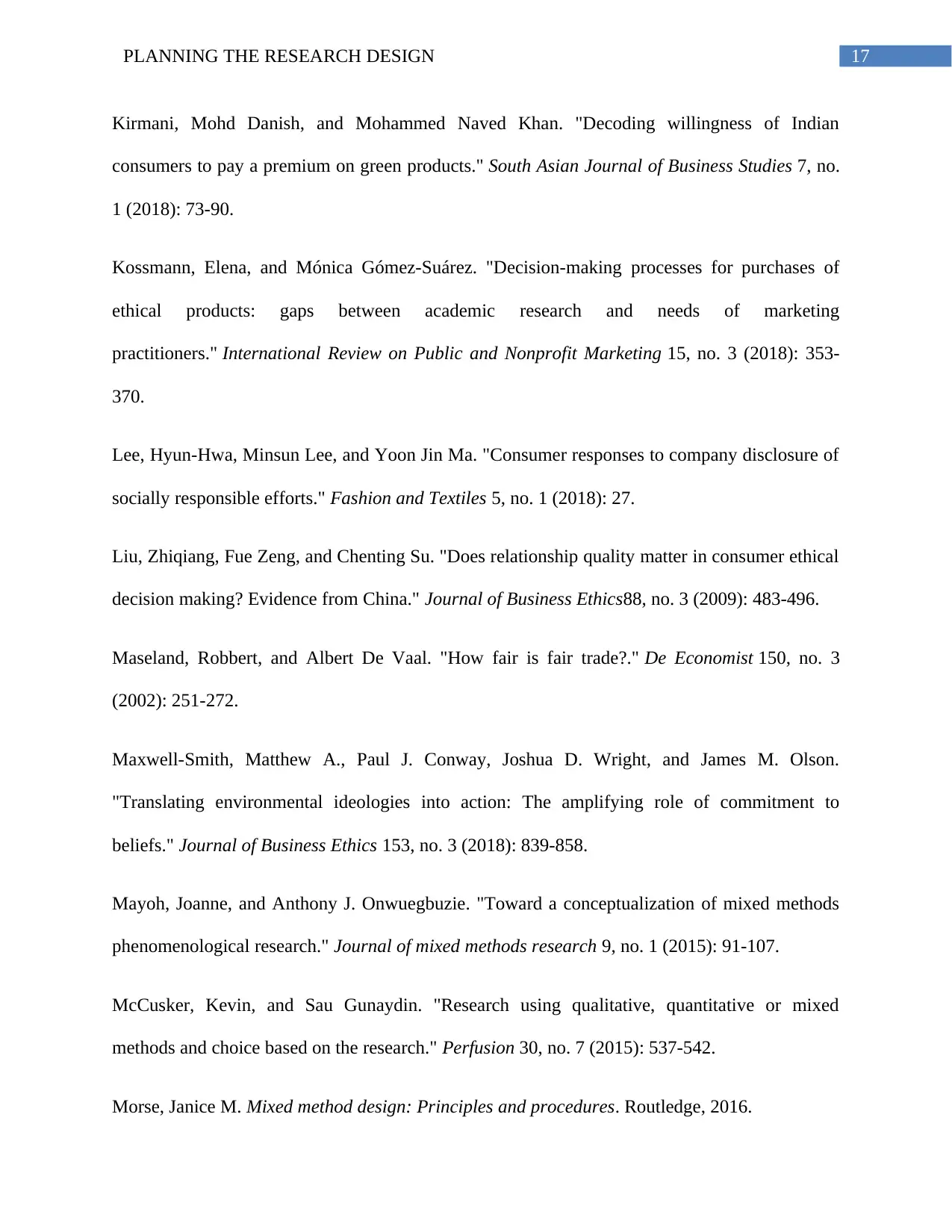
17PLANNING THE RESEARCH DESIGN
Kirmani, Mohd Danish, and Mohammed Naved Khan. "Decoding willingness of Indian
consumers to pay a premium on green products." South Asian Journal of Business Studies 7, no.
1 (2018): 73-90.
Kossmann, Elena, and Mónica Gómez-Suárez. "Decision-making processes for purchases of
ethical products: gaps between academic research and needs of marketing
practitioners." International Review on Public and Nonprofit Marketing 15, no. 3 (2018): 353-
370.
Lee, Hyun-Hwa, Minsun Lee, and Yoon Jin Ma. "Consumer responses to company disclosure of
socially responsible efforts." Fashion and Textiles 5, no. 1 (2018): 27.
Liu, Zhiqiang, Fue Zeng, and Chenting Su. "Does relationship quality matter in consumer ethical
decision making? Evidence from China." Journal of Business Ethics88, no. 3 (2009): 483-496.
Maseland, Robbert, and Albert De Vaal. "How fair is fair trade?." De Economist 150, no. 3
(2002): 251-272.
Maxwell-Smith, Matthew A., Paul J. Conway, Joshua D. Wright, and James M. Olson.
"Translating environmental ideologies into action: The amplifying role of commitment to
beliefs." Journal of Business Ethics 153, no. 3 (2018): 839-858.
Mayoh, Joanne, and Anthony J. Onwuegbuzie. "Toward a conceptualization of mixed methods
phenomenological research." Journal of mixed methods research 9, no. 1 (2015): 91-107.
McCusker, Kevin, and Sau Gunaydin. "Research using qualitative, quantitative or mixed
methods and choice based on the research." Perfusion 30, no. 7 (2015): 537-542.
Morse, Janice M. Mixed method design: Principles and procedures. Routledge, 2016.
Kirmani, Mohd Danish, and Mohammed Naved Khan. "Decoding willingness of Indian
consumers to pay a premium on green products." South Asian Journal of Business Studies 7, no.
1 (2018): 73-90.
Kossmann, Elena, and Mónica Gómez-Suárez. "Decision-making processes for purchases of
ethical products: gaps between academic research and needs of marketing
practitioners." International Review on Public and Nonprofit Marketing 15, no. 3 (2018): 353-
370.
Lee, Hyun-Hwa, Minsun Lee, and Yoon Jin Ma. "Consumer responses to company disclosure of
socially responsible efforts." Fashion and Textiles 5, no. 1 (2018): 27.
Liu, Zhiqiang, Fue Zeng, and Chenting Su. "Does relationship quality matter in consumer ethical
decision making? Evidence from China." Journal of Business Ethics88, no. 3 (2009): 483-496.
Maseland, Robbert, and Albert De Vaal. "How fair is fair trade?." De Economist 150, no. 3
(2002): 251-272.
Maxwell-Smith, Matthew A., Paul J. Conway, Joshua D. Wright, and James M. Olson.
"Translating environmental ideologies into action: The amplifying role of commitment to
beliefs." Journal of Business Ethics 153, no. 3 (2018): 839-858.
Mayoh, Joanne, and Anthony J. Onwuegbuzie. "Toward a conceptualization of mixed methods
phenomenological research." Journal of mixed methods research 9, no. 1 (2015): 91-107.
McCusker, Kevin, and Sau Gunaydin. "Research using qualitative, quantitative or mixed
methods and choice based on the research." Perfusion 30, no. 7 (2015): 537-542.
Morse, Janice M. Mixed method design: Principles and procedures. Routledge, 2016.
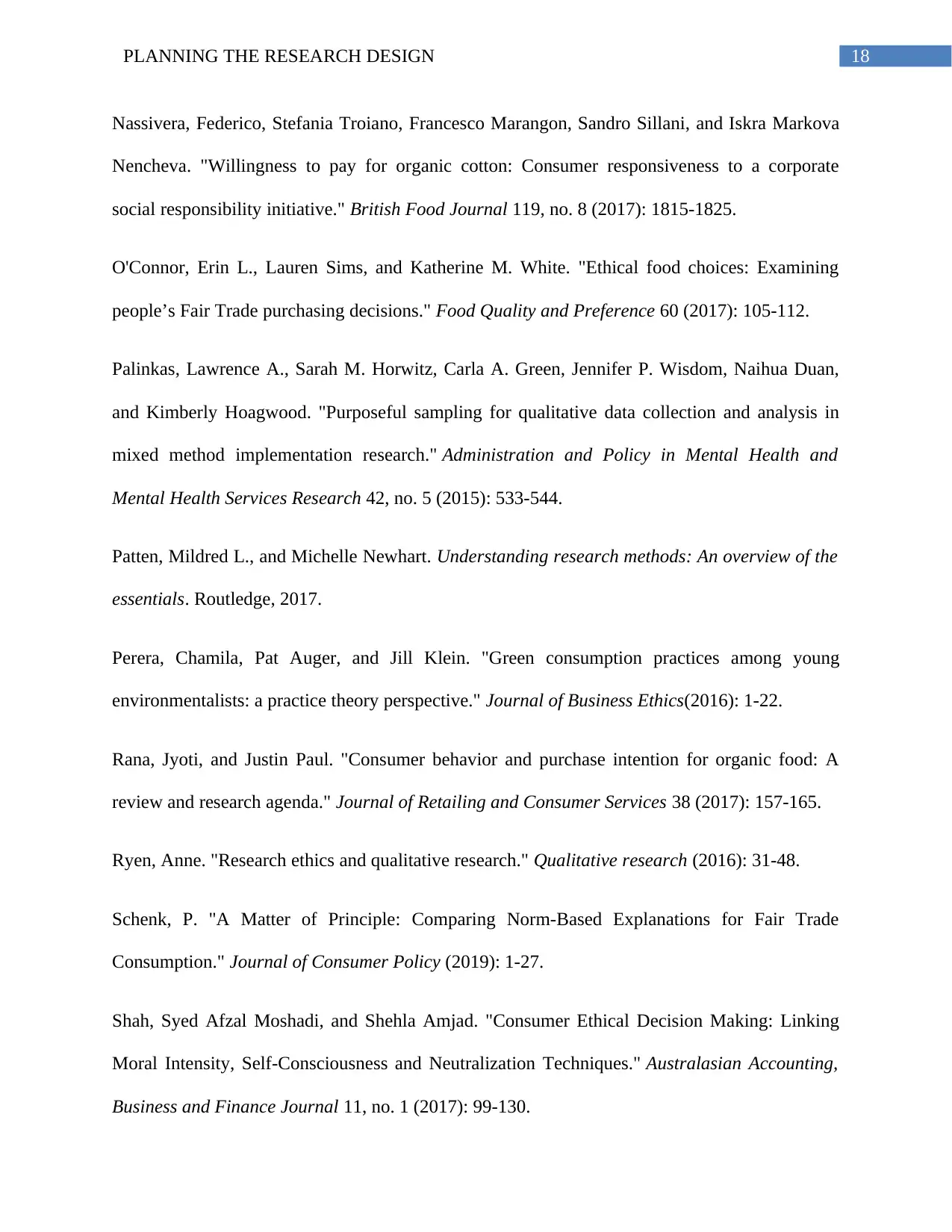
18PLANNING THE RESEARCH DESIGN
Nassivera, Federico, Stefania Troiano, Francesco Marangon, Sandro Sillani, and Iskra Markova
Nencheva. "Willingness to pay for organic cotton: Consumer responsiveness to a corporate
social responsibility initiative." British Food Journal 119, no. 8 (2017): 1815-1825.
O'Connor, Erin L., Lauren Sims, and Katherine M. White. "Ethical food choices: Examining
people’s Fair Trade purchasing decisions." Food Quality and Preference 60 (2017): 105-112.
Palinkas, Lawrence A., Sarah M. Horwitz, Carla A. Green, Jennifer P. Wisdom, Naihua Duan,
and Kimberly Hoagwood. "Purposeful sampling for qualitative data collection and analysis in
mixed method implementation research." Administration and Policy in Mental Health and
Mental Health Services Research 42, no. 5 (2015): 533-544.
Patten, Mildred L., and Michelle Newhart. Understanding research methods: An overview of the
essentials. Routledge, 2017.
Perera, Chamila, Pat Auger, and Jill Klein. "Green consumption practices among young
environmentalists: a practice theory perspective." Journal of Business Ethics(2016): 1-22.
Rana, Jyoti, and Justin Paul. "Consumer behavior and purchase intention for organic food: A
review and research agenda." Journal of Retailing and Consumer Services 38 (2017): 157-165.
Ryen, Anne. "Research ethics and qualitative research." Qualitative research (2016): 31-48.
Schenk, P. "A Matter of Principle: Comparing Norm-Based Explanations for Fair Trade
Consumption." Journal of Consumer Policy (2019): 1-27.
Shah, Syed Afzal Moshadi, and Shehla Amjad. "Consumer Ethical Decision Making: Linking
Moral Intensity, Self-Consciousness and Neutralization Techniques." Australasian Accounting,
Business and Finance Journal 11, no. 1 (2017): 99-130.
Nassivera, Federico, Stefania Troiano, Francesco Marangon, Sandro Sillani, and Iskra Markova
Nencheva. "Willingness to pay for organic cotton: Consumer responsiveness to a corporate
social responsibility initiative." British Food Journal 119, no. 8 (2017): 1815-1825.
O'Connor, Erin L., Lauren Sims, and Katherine M. White. "Ethical food choices: Examining
people’s Fair Trade purchasing decisions." Food Quality and Preference 60 (2017): 105-112.
Palinkas, Lawrence A., Sarah M. Horwitz, Carla A. Green, Jennifer P. Wisdom, Naihua Duan,
and Kimberly Hoagwood. "Purposeful sampling for qualitative data collection and analysis in
mixed method implementation research." Administration and Policy in Mental Health and
Mental Health Services Research 42, no. 5 (2015): 533-544.
Patten, Mildred L., and Michelle Newhart. Understanding research methods: An overview of the
essentials. Routledge, 2017.
Perera, Chamila, Pat Auger, and Jill Klein. "Green consumption practices among young
environmentalists: a practice theory perspective." Journal of Business Ethics(2016): 1-22.
Rana, Jyoti, and Justin Paul. "Consumer behavior and purchase intention for organic food: A
review and research agenda." Journal of Retailing and Consumer Services 38 (2017): 157-165.
Ryen, Anne. "Research ethics and qualitative research." Qualitative research (2016): 31-48.
Schenk, P. "A Matter of Principle: Comparing Norm-Based Explanations for Fair Trade
Consumption." Journal of Consumer Policy (2019): 1-27.
Shah, Syed Afzal Moshadi, and Shehla Amjad. "Consumer Ethical Decision Making: Linking
Moral Intensity, Self-Consciousness and Neutralization Techniques." Australasian Accounting,
Business and Finance Journal 11, no. 1 (2017): 99-130.
Paraphrase This Document
Need a fresh take? Get an instant paraphrase of this document with our AI Paraphraser
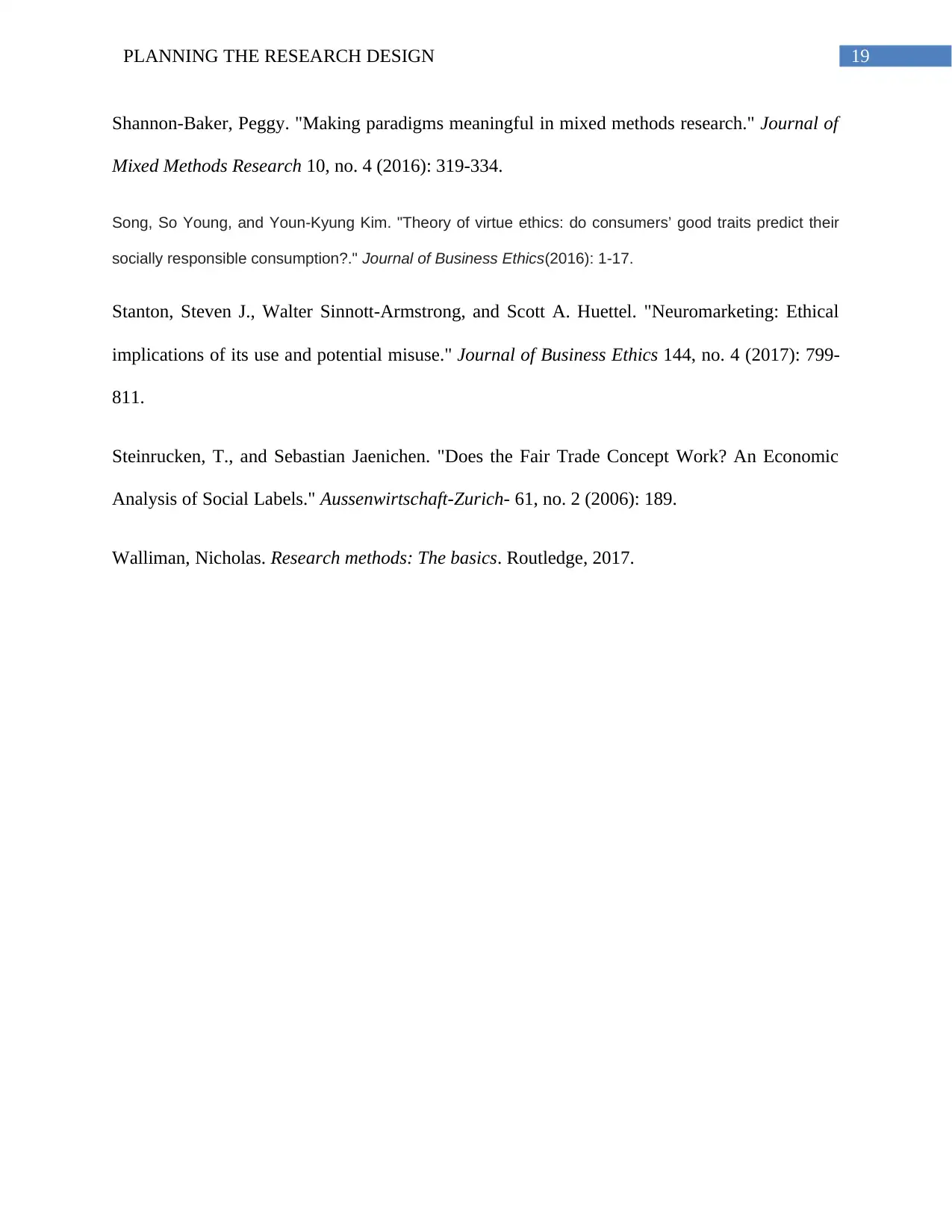
19PLANNING THE RESEARCH DESIGN
Shannon-Baker, Peggy. "Making paradigms meaningful in mixed methods research." Journal of
Mixed Methods Research 10, no. 4 (2016): 319-334.
Song, So Young, and Youn-Kyung Kim. "Theory of virtue ethics: do consumers’ good traits predict their
socially responsible consumption?." Journal of Business Ethics(2016): 1-17.
Stanton, Steven J., Walter Sinnott-Armstrong, and Scott A. Huettel. "Neuromarketing: Ethical
implications of its use and potential misuse." Journal of Business Ethics 144, no. 4 (2017): 799-
811.
Steinrucken, T., and Sebastian Jaenichen. "Does the Fair Trade Concept Work? An Economic
Analysis of Social Labels." Aussenwirtschaft-Zurich- 61, no. 2 (2006): 189.
Walliman, Nicholas. Research methods: The basics. Routledge, 2017.
Shannon-Baker, Peggy. "Making paradigms meaningful in mixed methods research." Journal of
Mixed Methods Research 10, no. 4 (2016): 319-334.
Song, So Young, and Youn-Kyung Kim. "Theory of virtue ethics: do consumers’ good traits predict their
socially responsible consumption?." Journal of Business Ethics(2016): 1-17.
Stanton, Steven J., Walter Sinnott-Armstrong, and Scott A. Huettel. "Neuromarketing: Ethical
implications of its use and potential misuse." Journal of Business Ethics 144, no. 4 (2017): 799-
811.
Steinrucken, T., and Sebastian Jaenichen. "Does the Fair Trade Concept Work? An Economic
Analysis of Social Labels." Aussenwirtschaft-Zurich- 61, no. 2 (2006): 189.
Walliman, Nicholas. Research methods: The basics. Routledge, 2017.
1 out of 20
Related Documents
Your All-in-One AI-Powered Toolkit for Academic Success.
+13062052269
info@desklib.com
Available 24*7 on WhatsApp / Email
![[object Object]](/_next/static/media/star-bottom.7253800d.svg)
Unlock your academic potential
© 2024 | Zucol Services PVT LTD | All rights reserved.





